#when from the start he's a protagonist on the wrong side making bad choices & failing at them cuz he's not as evil as Zhao & Azula & Ozai
Text
In reference to this post I reblogged earlier, but don't want to muck up UC's activity:
#i think it's more important to see that redemption is in the eye of the beholder
#not everybody (characters or real people) will accept the same type or amount of repentance for the same sins
#some people might not care at all if the person who wronged them feels sorry; only if they materially repaid their crimes
#others can feel the opposite
#and either way that's their prerogative
#you can disagree with the characters or the fans or the writers about who “deserves” OR has “achieved” redemption and that's okay
#because it's ultimately a complex philosophical issue
#like i agree with OP!!! but there's media literacy in accepting that not everyone will
I'm going to disagree with many of these tags, especially it being "in the eye of the beholder" and would argue it's more media literate to recognize when a character has a workable redemption arc even if one disagrees they "should" get one. It took me a long time to learn this cuz of how we're usually taught redemption = forgiveness in Western (especially very Christianized, and especially if explicitly raised Christian) culture:
It doesn't rely on anyone but the person seeking redemption.
Yeah, it's the wronged party's prerogative to never forgive, to think the perpetrator's atonement (and/or punishment) is not enough and never will be. Anyone (characters and actual people) who sympathize, and who are on their side, can agree it's not ever enough and that character/person's sins are unforgivable.
And that still doesn't matter to their redemption.
We have an example of a workable redemption arc that not all accept in Final Fantasy XIV with Fordola's situation, through the Endwalker healer role quests. She was raised a collaborator of Ala Mhigo's imperial occupiers, and thought the best way to help her people was to soldier for the empire, becoming their Butcher.
In the Stormblood patches, Raganfrid says he will never forgive her; he thanks her for the aid she gave in the throne room that day, but that's all. And even in the EW healer role quests, their interactions are complicated. He still can't forgive the collaborators, even as he works to reintegrate them into Ala Mhigan society. He recognizes many thought they had no choice. He can't, won't, forget the pain of losing his own loved ones to them. This is stated multiple times.
And others, like M'rahz, Sarisha, and M'naago also struggle, also say they won't forgive...but reluctantly agree they can understand how for the sake of their families, the collaborators felt pushed against a wall, and what lengths have they themselves gone to for their own families? M'naago even scolds Fordola: she doesn't get to give up, she has to keep working--or she dies as exactly what everyone said she was.
Fordola starts out as the one punished for her sins. Through the story, she makes her choices to change and fight and work for her people as a free woman. There are still those who despise the Butcher, and always will. Redemption comes from Fordola's actions, Fordola's choices. Who forgives her and who doesn't can't change that she has changed, and continues to do so.
And in the interest of fairness, for the opposite of Fordola, we have Laurentius. In A Realm Reborn, he collaborated with the empire, selling out his nation. He came out of his punishment wanting a new chance, so joined the Crystal Braves...and immediately fell under Ilberd's sway. While others remained loyal and stuck to their morals (and paid for it with imprisonment or even death), Laurentius went along with all of Ilberd's plans. And in the end, the player gets an opinion in the punishment he and his comrade face, but it's clear from talking to Raubahn there isn't much hope. Laurentius had his chances, but he didn't make any effort to actually change--so faced the consequences.
For Reference for the Healer Role Quests: Garland Tools Healer quest text starting with "Far From Free", and my own saved text in Gdocs (raw, not very organized compared to my later saved/updated docs).
(Nero's the war criminal who...didn't even get a slap on the wrist, he just waltzed into a leadership meeting 15 mins late with Starbucks and has been helping us save the world since. Gaius is the war criminal that went through traumas, saw his privileged preconceptions torn apart, and is starting down that road in the wake of Werlyt to clean up his mistakes and not let his children's sacrifices be in vain. None of these characters "need" punishment to decide to change; some of it simply happens as part of their stories, but they make their own choices and actions toward atonement.)
(Also redemption is usually an ongoing process, which is why "Death Equals Redemption", like how Yotusyu's situation is framed, is so dicey and often unsatisfying; are they actually changed, or they just getting out of putting in that effort to? Nothing indicated Yotsuyu actually cared to change, as sympathetic as she was in the end! But she has her redemptive moment for her fans, and the people who hate/won't forgive her also "win"--the trope is a "have your cake and eat it too" writing cop-out IMO at this point.)
#final fantasy xiv#endwalker#stormblood#role quests#redemption#character arcs#fordola rem lupis#raganfrid bleaker#laurentius daye#yotsuyu ge brutus#I also blame everyone touting Zuko from Avatar the Last Airbender as a 'good redemption arc'#when from the start he's a protagonist on the wrong side making bad choices & failing at them cuz he's not as evil as Zhao & Azula & Ozai#he's an antagonist to Team Avatar for much of it yes but he's also in a dual position as we follow his exploits as much as the Gaang#Zuko makes mistakes he has to apologize & make up for but as mixed up as that kid was he never actually hit murderous war criminal#heck his story starts cuz he was trying to protect soldiers from being needlessly sacrificed by actual warmongers#so Zuko the kids show character is Palatable & easy to forgive cuz he's always been sympathetic & Trying to do right but failing at it#but anyone 'worse' than traumatized teen navigating dangerous & toxic situations trying to do what's right w/out knowing what that is - SOL#cuz so many people have never expanded thinking about morality beyond that kids show
45 notes
·
View notes
Text
Sonny Carisi: Dumpster Fire
Word Count: 2379
TW: Fluff; mutual pining.

There were good days and bad days with SVU. The good days were defined, usually, by the full weight of justice being applied to the perpetrators. By virtue of your work, the bad days were more prevalent. And there were levels of bad.
Bad: a date-rape at Hudson University. Worse: uncovering a string of assaults at a Catholic high school. Worst: a violent rapist-murderer cutting a bloody swath through Manhattan.
You weren’t sure where today would rate. It certainly wasn’t the worst, but it was far from good. You and your partner, Fin, were running a stake-out in broad daylight, waiting for a suspect to pop out of his Upper East Side apartment so that you could nab him.
You didn’t mind stake-outs with Fin. He didn’t chatter away endlessly, trying to fill the silence. He didn’t smoke in the car. He knew the city like the back of his hand and, as a result, knew the best coffee shops and every bodega with a bathroom available to the public. Important stuff, for a stake-out.
Mundane moments like that can take a hard swerve, and that’s exactly what happened: the suspect left his house. You and Fin exited the car, and the moment the suspect saw you both, he took off running. You – the faster and younger – took off after him while Fin brought the car around and called for back-up.
Days like this can go bad (the suspect gets away) or worst (the suspect takes and kills a hostage). Today, you caught the suspect but it came at a price: a scuffle on the sidewalk, flailing limbs. You took a hard elbow to the ribs that left you momentarily stunned before you hauled the suspect to the ground….and he pulled you down with him. Into the pile of garbage bags. Then more scuffling, which broke open some of those garbage bags.
Which, it must be said, had been simmering in the warm spring morning.
By the time Fin caught up and helped cuff the suspect, your entire outfit was grimy with liquids and semi-liquids that you didn’t want to consider too much. As it was, the smell of you made you want to empty the contents of your stomach onto the sidewalk.
Fin thought it was hilarious, and he alternated between laughing and gagging at the smell the entire ride back to the precinct. Once there, you made a beeline for your locker.
And your day got worse.
You usually kept a spare outfit at work precisely for this reason – shit went wrong sometimes. You usually rotated the spare outfit every few weeks – took it home, got it dry-cleaned – so it didn’t take on the stale, old-building smell of the precinct.
But you had taken your spare outfit home a few days ago and kept forgetting to replace it. The dry-cleaning bag with its crisp shirt, sharp suit – it was still hanging on the coat tree in your entryway. You walked past it this morning and completely failed to bring it in.
Which left you with two options: stay in your reeking clothes soaked in garbage juice, or change into the clothes in your gym bag. Neither choice was great, and you sighed heavily as you started to unbutton your shirt and strip.
-----
Growing up, like most girls, you had read the entire library of Judy Blume books. You had never related to the protagonists, though, when they waxed poetic about wanting breasts. You had never felt such desire – probably because you had developed early, and could hardly remember what it was like to not navigate the world with larger breasts.
You camouflaged them well: at work, you stuck with dark colors, high collars, and well-tailored coats and blazers that minimized your figure. You weren’t ashamed of them, exactly, but you knew what people thought when they saw them. The assumptions they would make. Throughout the course of your life, you had been accused plenty of times of using your voluptuous figure for a step up. You hadn’t, of course, but people were always going to assume the worse, it seemed.
Now, you had to do the best you could with what you had. The day was nearly over, and you didn’t have court or anything public-facing. You just had to run out the clock at your desk.
Or more precisely, run out the clock at your desk in your gym clothes: the black track pants were fine, and aside from the racing stripes down the side, they could even pass for dress pants to an unwary observer. It was the t-shirt that was the problem.
Bad enough that it was a v-neck, which meant that you had some cleavage on display now. Worse that you had an off-beat, off-color sense of humor that you kept carefully separate from your work life. You had tried so hard to cultivate a professional persona at work, and now here you were, about to walk into the bullpen in a t-shirt with picture of a box on the front, and the legend “Schrödinger did it for the pussy” writ large across your chest.
Fucking fantastic.
But maybe no one would notice. Liv was at 1PP with Mike, Barba was in a grand jury all day, Fin was escorting the suspect to the tombs to cool his heels for a while. That only left Sonny and Amanda….maybe they wouldn’t notice.
They noticed.
Of course they did – two steps into the bullpen, and Amanda gave a low whistle, which made Sonny’s head swivel around to follow her gaze. To land on you. More specifically, to land on your chest.
It was extraordinary watching Sonny’s face. It was an entire journey, of the sweet gentlemanly guy you harbored a small crush on to a more base man ogling you. Those bright blue eyes of his went to your chest first, then stuttered up to your face, then went back down to your chest. You watched his forehead furrow a little at the legend on your shirt. His cheeks had instantly pinked when he first saw you, but his face got steadily redder and redder until he was furiously crimson. His gaze finally settled somewhere over your head and past you, probably in an attempt to avoid the obvious place it wanted to settle.
Amanda, for her part, was also red in the face, but mostly from the gales of laughter.
“Zip it,” you muttered through your clenched jaw, and you crossed your arms over your chest which, unfortunately, pushed your breasts up to even more ludicrous heights. Sonny made a choking sort of cough, and you felt your own blush breaking out across your face.
You made your way to your desk and slumped down in your seat, wishing you were invisible. Funny, how a moment could slam you right back into your adolescence, with all the awkward pain of living in a body you couldn’t quite control. You were an adult with a career and an apartment and a pet cat, but right now, you felt like a child.
At one point, you heard Amanda whisper something to Sonny, but you couldn’t make it out and you ignored it. You only slumped a little further into your seat and stared at your computer screen. You almost always gave 110% at work, but this was a run-out-the-clock situation. You just wanted to go home and bury your head under a blanket.
It surprised you when Sonny suddenly materialized in front of you. You looked up but refused to quite meet his gaze – you had a small infatuation for the man, and the coolly professional vibe you had been trying to put out there was effectively dead now. There was no coming back from it.
“Here,” he said, and he held out a grey zip-up sweatshirt. Then, as an afterthought, he added, “it’s clean.”
“Thanks,” you replied. You took it from him and pulled it on. Zipped it up, and breathed a sigh of relief when it cleared your chest with some clearance.
“I just thought, you know,” he offered, and he rubbed the back of his neck like he did when he was nervous. “It’s a funny shirt, but it might get unwanted attention on the subway. On the ride home, I mean.”
“Thanks,” you repeated, and his sweet gesture made you look him in the eye and smile. “I appreciate it. And I’ll get it back to you tomorrow. I promise.”
“No rush.” He reached up and rubbed his neck again, and you wondered if he was aware of it. “It, uh, looks good on you.”
That made you laugh. “Liar,” you said, and he shook his head with a grin and went back to his desk. The sleeves were just a bit too long, and you rolled them up carefully. He said it was clean, but it smelled like Sonny. You raised one sleeve up to your face and took a surreptitious sniff. You knew he was just being kind, but you still felt the same butterflies in your stomach that you got in high school, when you swiped your crush’s sweatshirt in the nascent stages of your relationship.
You weren’t the only one drawing those parallels. You heard Amanda and Sonny talking – no, whispering at each other, trying to keep their voices down across the bullpen – and you weren’t able to make most of it out.
You caught some of it though. You caught enough.
“…cute,” you heard Amanda say. “Want me to ask her to prom for you?”
“Shut up,” he hissed back.
You didn’t look over at them and just kept your eyes on your computer. You didn’t want them to know you had heard them, but they both trailed off into silence too, and together, the three of you ran out the clock.
*****
It was hard being Sonny sometimes.
He wanted to be the consummate gentleman, but he couldn’t help but stare when you came into the bullpen from the locker room. He had known you were cute, but god – you were a knock-out. You had kept it all hidden under your dark, conservative suits.
And then he felt like a creep, staring like that.
He felt worse when he saw how uncomfortable it made you, how you tried to make yourself invisible at your desk. He had two older sisters, one younger one, and while he wasn’t quite sure what it was like to be a girl, he had some faint memory of his sisters’ awkward teenaged years, the embarrassment when they started to develop and pull in men’s gazes.
It was mostly the reason he offered you his Fordham sweatshirt. But, if pressed, he’s admit that it made his stomach do a pleasant little flip-flop, seeing you in his clothes.
Amanda had something to say about it because she always had something to say. She had picked up on his discomfort around you early on, the way he stuttered a little, how he couldn’t quite meet your gaze without the tips of his ears turning red.
“Aw,” she whispered to him now in the bullpen. “You two are just too cute. Want me to ask her to prom for you?”
“Shut up,” he said. He chanced a look over at you, but you hadn’t heard – your head remained bent over some paperwork you were thumbing through.
“At least offer her a ride home,” Amanda continued. “You both live in Brooklyn. No sense in condemning her to public transit in that outfit.”
Sonny opened his mouth to argue – he didn’t want to seem forward or pushy – but Amanda was always giving him hell to be more proactive. He glanced back over at you and realized that his partner was right. It was mutually beneficial to drive you home: you could avoid the creeps on transit, and he could spend some time with you. Win-win.
“Fine,” he muttered, and it made Amanda cheer, which made you look up at them in surprise.
*****
The ride home should have been awkward but surprisingly was not. You put your ruined garbage clothes in Sonny’s trunk, and then settled in for the rush hour traffic and long ride home.
You hadn’t ever really sat and talked to Sonny socially – your scant few working lunches and happy hours always tended to end in conversations about work – but you chatted now. He told you about his family, his time of the force. You did the same. You offered the story of earlier in the day, how you ended up soaked in garbage-juice. He offered his own story from his days in Homicide and how he got dumped in the Harlem River once in February.
By the time you were in Brooklyn, you felt like old friends almost.
You directed Sonny to your building, and he pulled into a spot with a fire hydrant. He parked the car but kept it running, and you both climbed out. He popped the trunk and handed you the bag with your ruined clothes, and you took it with your thanks.
“I really appreciate this, Sonny,” you said. “Both this – “ you gestured at your front, the Fordham sweatshirt, “- and the ride home. Today was a real dumpster fire, but it’s ending okay, thanks to you.”
He smiled at you, that patented Sonny sunniness, and he pointed down the street. “You know, I only live about five blocks that way. We could car-pool, if you want.”
You felt that tell-tale feeling of butterflies in your stomach, but you couldn’t help but smile back at him. “That would be nice.” You paused and then added, “I can return your sweatshirt tomorrow.”
He waved you off and walked back to the driver’s side. “Don’t worry about it. I said it looks better on you. You can keep it.” Then he waved again and ducked back into his car, but not before you noticed the blush reddening his ears.
You stayed on the sidewalk and waved as he pulled away, then went into your building. Days at SVU can go from good to bad, bad to worse – but as you settled in for the evening, wrapped in Sonny’s oversized sweatshirt that smelled just like him, you realized that sometimes a day can go from bad to good, too.
#sonny carisi#sonny carisi imagine#sonny carisi x reader#sonny carisi x you#law and order svu#law and order svu fanfiction#tropes-and-tales
137 notes
·
View notes
Text
youtube
This was a very interesting analysis, especially if we apply it to Houses.
On the one hand, it basically adds weight to Dimitri calling Edelgard selfish for her goal of imposing her own beliefs on others. It does make it out that her own ego is disruptive to the world around her and she is so caught up in it that she can't see the truth. It's why she chooses wilful ignorance, such as ignoring that her father was an Agarthan puppet because she's taken his words as an absolute truth. It's why she's doesn't deviate from her path.
The fact that part of this is knowing your place in society also seems to tip into why Flower is considered the bad route. Byleth is liked because they are very sociable, helping people in need while maintaining humility despite their powers. Byleth is what people like about silent protagonists in Japan. But joining Edelgard means, after the reveal, that Byleth is supporting someone who tried to have her classmates killed in the prologue. Not only that, they forget their position as a teacher who was supposed to guide their students and instead follows the lead of the school shooter. Even Byleth's loss of Nirvana and lack of goal in their Flower endings, just following their spouses, shows that they don't know where their place anymore.
And of course, this represents a disconnect between the East and West. We want our choices to matter as a part of our more individualistic outlook than Japan's collectivist outlook. The fact that the player has to choose to side with Edelgard, asserting their own will rather than letting things play out, makes it more appealing option but people invest more into it because they see it as a reflection of themselves. Therefore, if they picked Edelgard they're going to like it more because it's a choice that causes the story to deviate in a way they want it to, and because of that they're going to start viewing it as an expression of their own values causing them to like it more in a masturbatory way.
But this means you're asserting your own ego on Fodlan, and because of that people are more apt to dismiss the truth that goes against it rather than seeing things for how they are. It's why the teacher theory was created, as it went against the author's reading of Edelgard, and why Edelgard's supporters flipped out when the game's devs spelled out that she was the villain. Players in the West put too much of their self into the game it's blinding them from the truth, much like Edelgard herself (This also extends to the Claude stans who fail to understand that his story is about how he was initially wrong about Rhea and Fodlan resulting in him changing his stance).
The Buddhist lens of the game, something downplayed in the translation, ultimately is telling players to accept the truth of Edelgard being the villain and to do the right thing by stopping her. Do this rather than putting your own desires ahead of the good of Fodlan. It's treated as a more black and white manner, fitting as Edelgard leads the Black Eagles while Rhea is the White One in Japan.
5 notes
·
View notes
Text
the difference between static and dynamic characters on the dream smp
Hi, hello, it's Ruby, back with another PSA because this fandom (specifically the people on Twitter) keeps getting worse.
/dsmp /rp
Recently, people started claiming c!Techno was boring because he never had any character development.
Now, this may come as a surprise to some of you, but if you in any capacity decide to study the ins and outs of creative writing, you'd learn that characters don't need to have character development to be compelling, loved by the audience, and have a complex personality.
This is what is called a static character. Not to be confused with flat characters. What's the difference?
Most articles seem to agree on this;
"Static characters should not be confused or mixed up with flat, one-dimensional characters. Though neither changes as the story progresses, if a character remains unchanged, it does not mean that he is one-dimensional like a flat character. A static character can be perfectly interesting, like Sherlock Holmes, who is completely ingenious, eccentric, and sometimes jerky. He never changes, but the audience still loves him. Thus, a static character could be the protagonist too, and a flat character, on the other hand, only plays a side role in the story." - ( link to definition )
Static characters are ones that don't experience any personal growth during the span of the story. They're often used in writing, because they're realistic and can be interesting if well-written. This article provides examples such as the aforementioned Sherlock Holmes, Captain America from The Avengers, and TommyInnit from the Drea- [gunshots]
But in all seriousness, c!Tommy is very easily a static character; a lot of the criticism of his character is about the fact that he doesn't change. He does gain experience and new relationships, he does suffer and becomes more and more traumatized, he does make choices out of impulse or emotion, but none of that is character development - he never overcomes his character flaws, including selfishness, stubbornness, and a lack of compassion or empathy for others. And I do not blame him for it as a person, and I do not consider him a badly-written character, even if he's a little frustrating to watch sometimes.
c!Tommy has two main reasons why he remains a static character.
a) he doesn't live in a constructive environment
It is normal for boys Tommy's age to be low on empathy. It's completely normal for them to be chaotic, immature pricks, because that is part of their growth. All of this would be just fine if c!Tommy was growing up in a highschool; however, he in actuality grew up on a land ruled by politics, wars and conflict.
I do not like using the age excuse, because I do not believe it makes his bad choices any more justified, but it's easy to realize why him being in such a position could stunt his personal growth.
At that age, you need guidance, whether it be from teachers, parents, or whatever other figures you're able to find around you. Usually, it is not difficult to find good people to look up to in today's world, but for c!Tommy, that isn't true.
In the pre-L'Manberg, post-Tommy era, there was moderate peace. Yes, there were conflicts, but none of them were damaging in the long term for anyone involved, and they were chaotic scuffles more than fights of ideals.
Once c!Wilbur came along, c!Tommy latched onto him. We all know how that went.
None of the adults Tommy had looked up to were in any capacity helpful to him growing or becoming a better person. He helped lead a revolution to help Wilbur gain power, he was lead to help Wilbur lead and unfair election, and witnessed the breakdown of the man he trusted shortly after. He was subjected to emotional manipulation by Dream, and then came to the wrong person for help. None of these things are reasons for positive change.
b) it's his major character flaw
Even in the few chances he had at genuine change, at forgiveness, at letting go, all provided by the environment or people around him, he didn't take them. Tommy doesn't like change, he fights it, and that is why he always loses. He doesn't want to change for the better, and he despises himself when he changes for the worse.
He looks for peace in a lack of activity, growth, or development. He searches for happiness in not letting go of the past, but hanging onto it for dear life, terrified that the people around him might change because he doesn't want to. And that is why, as long as he keeps this mindset, he'll never find it.
While other characters, such as Tubbo, Dream, Wilbur or Quackity seek to change the world around them, for the better or the worse, to rewind or to progress, and are willing to change themselves accordingly, Tommy does the opposite, because his biggest fear is people drifting apart and leaving him behind.
Let's get back to the point, then; what makes Technoblade a static character, and a good one at that?
His motivation is simple; he is a lawful character who sticks to his morals through thick and thin, follows a strict inner code, and is loyal to people above all.
On top of that, he is given no reason to change his morals.
No one's arguments against c!Techno have ever made much sense, let's be honest, and ever since he'd entered the server, Techno's been proven right over and over and over again.
He saw Wilbur face the consequences of having power over other people and then losing it, seeing the influence of corruption on the man he worked with. He was forced by the government to kill another person, to kill an ally, to kill an innocent. He was betrayed and used by the Pogtopian revolution, which knowingly kept things from Techno and fought to seize power, rather than destroy it. He was unfairly executed without a trial by corrupt politicians just absolutely demolishing the Geneva convention, holy crap people call Techno a war criminal, just in that one stream New L'Manberg commited so many war crimes-
Point stands that people say one thing and then do the other. Talk of freedom and then force people to do things (and no, forcing people not to force other people to do things doesn't count nor does it make Techno a hypocrite, get a better argument). Techno was never manipulated or swayed to someone's side against his ideals because he's not a man of words; he believes in what he sees, not what people tell him, especially since he's been repeatedly lied to.
That is the first thing a good static character needs; a strong motivation. Through everything that's happened, I'd say without a doubt that Technoblade has the strongest motivation out of everyone, which is to emancipate people from the tyranny of their rulers - not just sing about it and then establish a dictatorship - but to in fact do it, no matter the cost.
He's a very Paragon-type character, which is a common type of static; his moral code is too strong to allow emotional change.
Another thing a static character needs is personality. And Techno - if you watch his streams, not just others' perspectives - has a lot of that. From his bond with Phil and Ranboo to fondness of animals to sense of humour, the character is entertaining to watch and follow. You know what to expect of him, you know he won't betray, and that despite the flaws he has he will not let personal issues hold him back. He wins because he trains, and he puts hours into pulling crazy stunts, and he's persistent - it's satisfying for the people watching his perspective to see his efforts pay off.
His interactions with others are characterized by an attempt at kindness, no matter how many times he might fail at separating his personal life from the ideals he's pursuing.
And that is compelling! To draw parallels to Tommy again, the kid has so much personality that other characters could borrow from him and he'd still be fun to watch!
Neither Tommy nor Techno are flat characters, and I think that is the mistake a lot of people make when misinterpreting both the characters; Tommy and Techno are amazing examples of great static characters in fiction, and I'd like to applaud cc!Tommy and cc!Techno for being brilliant writers.
#dream smp#c!techno#c!tommy#dsmp analysis#c!techno analysis#c!tommy analysis#tommyinnit#technoblade#writing#dsmp fandom critical#long post under cut
335 notes
·
View notes
Note
the fact that edelgard is the villain in 3/4 routes and yet intsys STILL glorifies her to no end enrages and annoys me. no other villain has been given that perspective of “well actually maybe they arent so bad” except for the hypocritical tyrant. even when she has *literally become an inhuman monster* intsys is still like “oh no dont worry she was right actually!” and it upsets me deeply
It upsets me, too, friend. IntSys seems to really like glorifying people who don’t deserve it, especially in recent games (Walhart in Awakening, Rudolf in Echoes -- I can’t say if his whole ‘orchestrating a plan to have his son murder him’ thing is carry-over from Gaiden or not, but it definitely exists in the recent remake so I’m including it), but Edelgard actually ends up as a bit of a weird case.
(I have a lot of thoughts about this, so I’m just going to cut preemptively.)
Now, I’m actually not opposed to Edelgard being the protagonist of the fourth route in Three Houses. Anyone who’s been here a while knows that I generally see Grima, a figure that IntSys generally tries to paint as a rote villain, as at least a sympathetic villain (and possibly even a secret hero in the events of Awakening itself); it’s entirely possible for someone that’s a villain in most of their appearances to have legitimate reasons for what they’re doing and why, and revealing that in their personal route could be incredibly powerful if done well.
And here’s the thing: Edelgard really is a compelling character, in large part because of her moral ambiguity. I actually agree with her when she says that the Church of Seiros is corrupt at its core and the system needs to change. She’s right about that! While Seiros might have had decent reasons for establishing things this way, over the past thousand years human societies have changed while the church itself remained stagnant -- something potentially exacerbated by her selfish ambition to restore her mother -- and this has led to a structure that once served an important purpose becoming a toxic and destructive mess for humanity at large. Edelgard has a completely valid point there, and it’s something that I could absolutely get on board with if she had gone about achieving change in some other way, because she does have other methods available to her that she writes off without real reason -- and even that can relate back in part to her deep trauma and difficulty trusting people after the betrayals she faced at the hands of her “uncle” and her own father’s powerlessness to stop the nightmare she and her siblings suffered through.
IntSys probably could have crafted a narrative that showed from her perspective why she believed war against the Church was the only valid option available to her. The issue is that she undercuts her own argument by targeting all of Fodlan, rather than specifically going after the Church: she doesn’t give the Kingdom and Alliance a “stay out of my way or else” warning, she literally turns her sights on the Kingdom as soon as the monastery falls and attempts to fully annex it once Cornelia sets up Dimitri’s fall, leaving the Alliance only because she has her hands full with Faerghus. She didn’t have to take Cornelia up on her offer of making the Kingdom into the Dukedom of Faerghus and sending troops to finish the job: she could have just left the woman to her own devices, forcing the Twisted to utilize their own people to maintain and secure full control of the region while she worked on addressing the systemic issues, which would have had multiple benefits:
The Imperial Army doesn’t get overwhelmed and exhausted fighting in conditions they’re not equipped to deal with, leaving them stronger overall while the Twisted forces are potentially weakened by the same
Hubert is able to better assess the threat they’re dealing with, including learning their capabilities and possibly even where they’re coming from before Merceus
Edelgard actually puts her money where her mouth is and ends up helping the people she claims to be doing this for, rather than just using them as fodder for the war to grind up
Unfortunately, the way she’s written ends up just making her an imperialist. She’s not just going after the corrupt core of the Church, she’s trying to forcibly unite the continent and return Fodlan to some long gone ideal where it was all united under the Imperial banner because she refuses to believe that Adrestia could have split by natural causes.
Crimson Flower ultimately ends up being a particularly egregious example of this glorification phenomenon in action because they give her a personal route that makes no effort to critically examine her actions and make her face consequences for them. This, I think, does her a massive disservice as a character, because that aforementioned moral ambiguity that makes her so interesting could have been utilized to great effect -- and the proof is actually there already, because they do it in Dimitri’s route.
Dimitri is himself another interesting character, and outwardly presents as Edelgard’s polar opposite: he recognizes that he doesn’t have all the answers, struggles to figure out the correct course of action when presented with difficult subjects that have no clear-cut answer -- like the fact that reliance on the Crest system is toxic for noble families, but it’s those very Crest-bearers and their Relics that help keep Faerghus safe from invasion by Sreng -- possesses incredible strength but specifically refrains using it in most cases to avoid harming others, and generally takes everyone’s problems onto himself to his own detriment. He’s also deeply traumatized and was never given a chance to deal with it in a healthy manner, which contributes to how he snaps -- and Azure Moon starts with Dimitri being so far out of reach that you can’t unlock any of his supports and can’t even engage with him in the weekly discussions. He’s lost himself to his survivor’s guilt and need for vengeance, considers himself to be nothing more than a monster, and has no qualms about killing if it helps advance his quest; as the story progresses, he faces a direct consequence for this murderous inclination in the form of Fleche who attempts to exact vengeance for her brother’s sake in the same way that he’s attempting to claim it for his family and friends -- only to lose Rodrigue, and have his dying words be a plea for Dimitri to live for himself rather than those who died before him, at which point Dimitri sets his sights on opposing Edelgard rather than killing her and seeing to atone for the crimes he committed. While I think the game made the change a little too abrupt, it’s handled well overall, and shows a real development arc complete with both actions and their associated consequences that directly relate to Dimitri’s growth as a person.
Contrast this to Edelgard in general and Crimson Flower as a route. Edelgard believes that she has all the answers despite not trying to engage with anyone outside her own House, decisively chooses what she believes to be the right and proper course of action regardless of how difficult the subject matter, possesses great strength (both physically and of sheer will) that she uses to dominate others, and forces others to join her in addressing what she sees as problems -- such as her line about making her own people into “worthy sacrifices” for her “higher cause.” Crimson Flower is the only route where her attack on the monastery fails to capture Rhea, but once Byleth returns she sets her sights on attacking and subjugating a territory that has remained entirely neutral through the past five years, turns on the Twisted while she’s still in a vulnerable position which ultimately causes the deaths of at least a third of the forces she left at Arianrhod once they fire their warning shot, lies to her friends and allies about what happened there, murders her step-brother, and allows a city full of trapped civilians to burn unchecked while she deals with what she considers to be the “real” threat on the opposite side of the Faerghus capital -- and all of this is capped off with her never dealing with the Twisted, and cute little endcards that talk about how everything worked out fine and there were no problems ever, The End. Edelgard doesn’t get a development arc in her route: she’s never challenged, she never faces real consequences (and the one she does face she literally lies about to her friends and then leaves as a problem to deal with later), and she pretty much ends the game exactly where she started it: completely assured that she made the right choices. The moral ambiguity inherent in her character is instead cast as “of course she’s in the right, she’s so great and there’s nothing at all wrong with what she’s doing or how she’s going about it, isn’t she wonderful?”
At least in the main game, Hegemon Husk Edelgard is treated with real gravity, shown as the pinnacle of her drive to see her ambition come to fruition and the tragic consequence of her inability to change course and find another path. The Forging Bonds event just takes the CF brush and paints her actions as the right ones, even though what made her so compelling is that her reasons were right while her methods were horrific. Edelgard really could have been wonderful. The potential is right there in her character. But IntSys completely botched the execution of it, so that her route feels rushed, incomplete, and at best unsatisfying (or, if you’re me, utterly disgusting for how it glorifies imperialistic conquest), and her Heroes appearances only make it worse.
#answered#anonymous#fire emblem: three houses#edelcourse#look i really do find edelgard to be interesting#i just find intsys' execution of her character to be utterly terrible#and fandom at large has kind of made it worse#i'm just going to keep the nuance and explore the real consequences#and write a ton of fanfiction to that effect
30 notes
·
View notes
Text
Star Trek: The Characters
Storytelling, especially where it regards movies and television, is always evolving.
Whether it’s in deeper themes, better effects, different genres, or evolving archetypes, there is always something that is changing, except, perhaps, where the importance of characters are concerned.
Characters are an integral part of storytelling, particularly where it concerns television. When it comes to television, the setup is everything, and the characters are part of that setup, that ‘home base’ that the audience returns to at the start of every episode. The characters are the people that the audience gets to know, who star in each adventure. Characters are what holds the audience’s investment, the reason fanbases tolerate bad episodes and praise good ones. In the end, the main characters keep an audience’s attention, making each episode, even the bad ones, enjoyable.
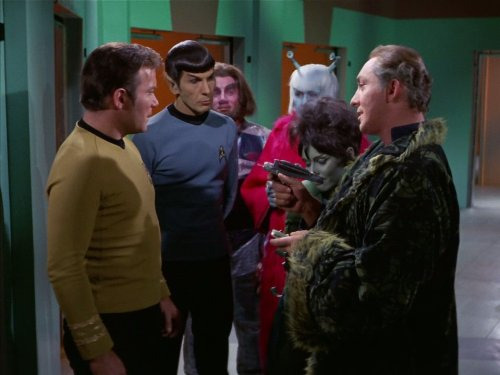
In short, characters can make or break a television show. It is vital that they be likable, or at the very least, interesting, lest the audience utter those eight deadly words:
I Don’t Care What Happens To These People.
Once those words are uttered, it doesn’t matter how gripping your narratives are. The viewers will start to leave.
See, while a film can get away with some lesser characters by distracting with an interesting concept, set-piece or a fast-paced story, television can’t. Thanks to a smaller runtime and a smaller budget, television, by necessity, tends to be character based. As a result, the main cast of a television show has to be able to work in multiple stories of different kinds.
This means that writing for characters on television can be pretty difficult.
The best television characters tend to merge two ideas together: That of relatability and entertainment value.
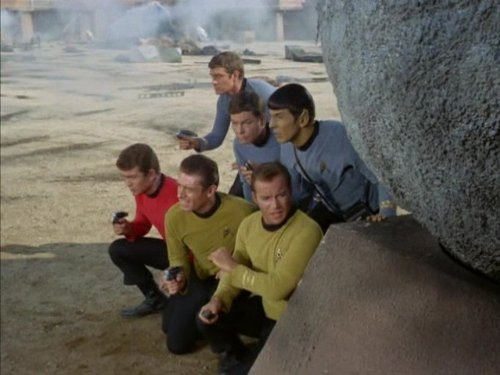
You see, television, like all stories, tells stories of exaggerated versions of reality, especially in the cases of science-fiction adventure shows like Star Trek. The only way to make an audience buy an unbelievable world is to create believable characters to place in that world, that relatability in the stories and characters. When we see McCoy’s frustration, or Kirk’s boldness, or Spock’s reservedness, we see elements of ourselves, our own personalities and lives. It is vital to make characters seem real, if not realistic.
The question is, does Star Trek manage to do that?
That’s the question we’re going to be answering today. Let’s take a look, starting with the Captain of the Enterprise Crew: James Tiberius Kirk.
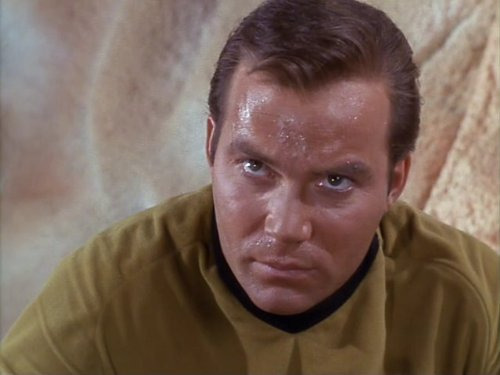
Kirk truly was The Captain in every sense of the word. A Reasonable Authority Figure who did far more adventuring than realistic counterparts would have, Kirk was an Action Man, level-headed, dutiful, and always loyal to his ship and his crew. A Bold Explorer (it’s in the job description), Kirk, while not fearless per say, took the Chains of Commanding quite seriously, and would often face down hugely powerful beings, power-mad computers, or other forces beyond him in order to save his crew. A Determinator to the last, known for his interesting ways to think outside the box and refusal to accept a ‘no win scenario’, he is the unquestionable Hero of the show, the Leader, who often throws the rules aside to do what he feels is right, in a constant battle To Be Lawful or Good. He was a Charmer, an expert fast-talker, and very smart. In later installations of the franchise, Kirk would become a Living Legend, much as he became in our own pop culture.
All that being said, the common cultural image of Captain Kirk isn’t quite right. Allow me to adjust it, as best I can.
More than any other character in Star Trek, or perhaps the history of television in general, Captain Kirk is possibly the most misrepresented character of all time. Since the ‘60s, Kirk has evolved into an icon of heroism, machismo, and brash boldness, with even the recent Star Trek reboot depicting, not Kirk, but rather, the distorted, separate idea of Kirk in the modern light.
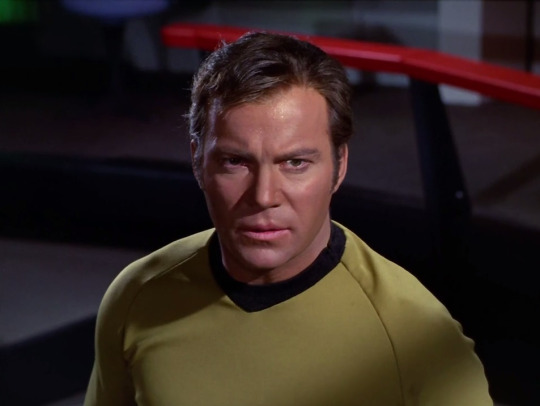
This idea, quite frankly, is just not right. While Kirk did have his share of romances, he was no womanizer, often entering into dubiously consented-to relationships reluctantly, in order to save the ship. The relationships he did actively pursue, he threw himself into wholeheartedly, and he was just as crushed as the other party every time they fell apart (for proof, watch City on the Edge of Forever or The Paradise Syndrome). Kirk was no player. As a matter of fact, he was a deeply compassionate man who respected the women in his life as much as he respected Spock and McCoy. It just so happened that the women in his life tended to not stick around, unlike his one true love: The Enterprise.
Even his reputation of the ‘Cowboy Captain’ isn’t accurate. As I mentioned before, Kirk was defined by compassion. His moments of ‘rule-breaking’ wasn’t to impose ‘the way he thinks things should be’, it’s because Kirk cannot bear to watch helpless people in trouble. The few times where he does break the famous ‘Prime Directive’ (To not interfere with less developed races) is to help. Kirk was a deeply moral character, determined to not stand by while people were taken advantage of. He wasn’t rash, either. While it may be accurate to say that the ship’s doctor, Leonard McCoy, was a bit on the hot-headed side, it is entirely inaccurate to accuse Kirk of the same. Kirk was an extremely smart man, a level-headed captain who was an expert at thinking fast. He trusted his instincts, but he trusted his advisors too, often finding a balance between McCoy’s impulsiveness and Spock’s cold rationality. Kirk’s intelligence and competence is often lost, overshadowed by his more extreme companions, and some audiences have forgotten the truth of Kirk’s character: a cunning problem-solver capable of saving the day under enormous pressure, whose decisions are far from based in irrationality. He is a romantic, duty-bound to protect his ship and crew, greatly exaggerated and mis-characterized in the years following his captaincy.
As such, Kirk was a well-rounded, balanced character, far more three-dimensional than the modern idea of him tends to give him credit for.
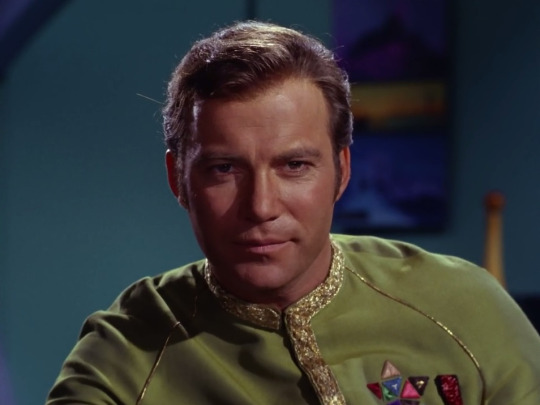
That’s all well and good, sure, but how does he fit as a main character in a television show?
As a matter of fact, absolutely incredibly.
Kirk serves as a wonderfully effective lead, compelling, entertaining, and interesting. Infinitely more developed than most leads of his time, and even more modern examples, Kirk was a game-changer, a revolutionary kind of protagonist who just worked. The perfect balance of the main trio of the series, Kirk is the perfect face for Roddenberry’s ideals: a hopeful pragmatist, an idealist who proves the best of humanity: compassion mixed with intelligence, boldness combined with understanding. A man of action surrounded by True Companions, Kirk was an extremely gripping protagonist who felt intensely, a perfect person for the audience to connect to and be invested in. He drove the stories, opposed the villains, and always saved the crew, as a hero should, but it’s important to note that Kirk was hugely human, possessing many of our greatest attributes, but some of our failings as well. He wasn’t perfect. Sometimes he made the wrong choice. In the end, though, he was us, or us as we should strive to be: always learning and helping, and always reaching for the stars.
But of course, Kirk wasn’t alone in his position as the ‘lead’ of the show. It’s doubtful the show would have survived in the popular culture as well as it did if it weren’t for his support team, his True Companions: Dr. Leonard McCoy, and, more famously: Mr. Spock.
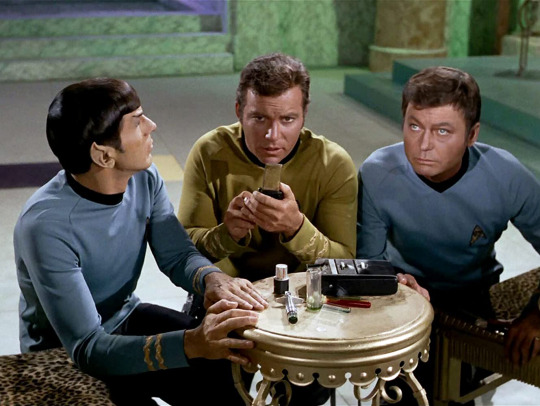
If Kirk represented the best of humanity, Spock represented the critique of it. In a previous article, I pointed out that Spock exists as a very unique character: a half alien, half human crewmember who, while equally valuable to the script and the characters as Kirk was, served a different purpose: to point out and explore humanity from the outside.
Like I’ve mentioned before, Spock is a different sort of character than Kirk is. Where Kirk is a demonstration of the best of humanity as we see it, Spock is a demonstration of humanity as someone else might. He served as a criticism of the human condition, a character at war with himself and his heritage, split between the emotional humans, and the rational Vulcans. Spock is the Number One, almost Comically Serious as he eschews his more illogical half and chooses to embrace the stoicism of the Vulcan people. A Gentleman and a Scholar, Spock has Hidden Depths, a heart of gold and deep emotions that he usually succeeds in hiding.
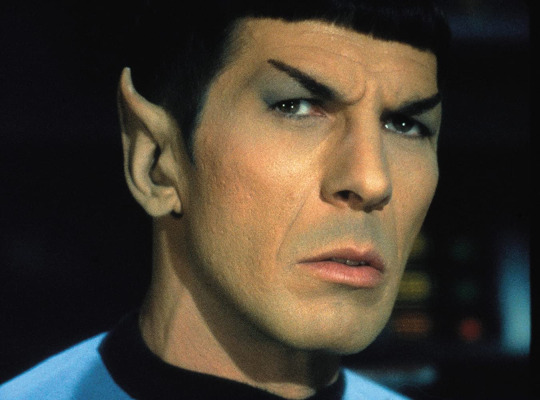
Most of the time. More on that in a minute.
Spock’s role in the show was The Smart Guy, the Stoic who had all the answers, all the statistics. He was the champion of impartial logic, of cold rationality. His job was to give Kirk the hard answers, to bring to him the facts and give him their options, especially the unforgiving ones. He is the cold to McCoy’s hot, a stern-faced, cold-blooded computer.
Or is he?
Much like Kirk, there is a lot more to Spock than meets the eye. While the cultural perception of Spock has often mutated into a parody of itself, much as it has done to Kirk’s reputation, Spock remains a much deeper character than he, or a brief skim of the series, lets on. As I said earlier, Spock is at war with himself, uncomfortable in his own skin. He insults humans for their humanity, but has strong, deep friendships with them. He is not above expressing frustration and their emotional natures when pushed (usually by other forces that knock his guard down), but isn’t frustration a human emotion?
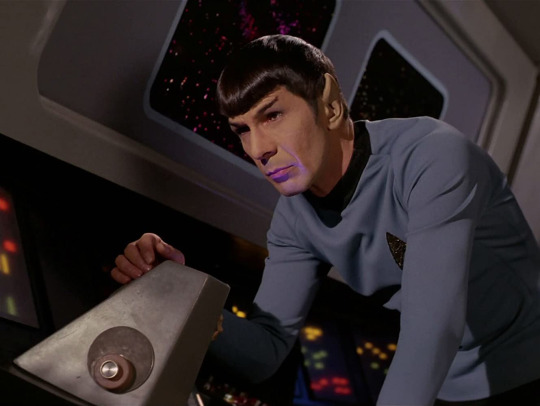
Spock is a bag of contradictions, a supposedly emotionless master of sarcasm, a man without feeling who invites his close friends (emotional humans) to a private Vulcan ceremony, a cold-blooded creature with undying loyalty who occasionally makes ‘illogical’ decisions that would make Kirk proud. A lover of music and a sympathizer to space hippies (Not one of Star Trek’s better episodes, admittedly), Spock was an outsider who fit neither fully as a Vulcan or Human, a person who was struggling to find his place in the universe.
At first, this seems incongruous with the ice-cold exterior he projects, however, rather than being an example of inconsistent writing, it’s a shining example of development and nuance.
You see, Spock never gives up his following of logic. He just begins to approach it differently.
Spock’s style changes slightly as Star Trek progresses (most notably in the films, released ten years after the show’s final season), from cold, ‘computer’ logic to something else: human logic.
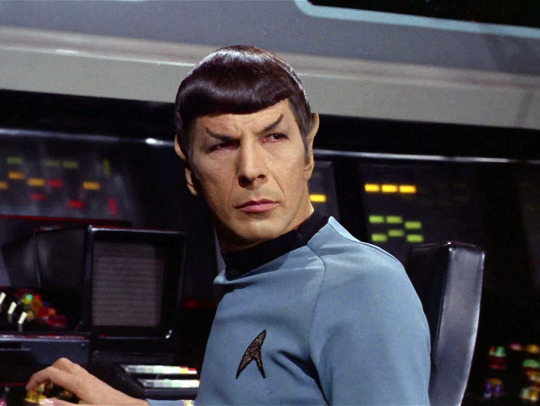
One thing of especial note in the original Star Trek show is that you could see characters visibly affecting one another. Kirk, Spock and McCoy all influenced each other in the ways they thought, reacted, and planned, and worked best as a unit. In this, the humanity of the main cast affected Spock in his slow, reluctant appreciation of human merits. In time, Spock began to make one or two decisions based on human logic, intelligence and emotion. In episodes like The Menagerie or The Galileo Seven, Spock makes decisions that seem out-of-character for him, based in emotion.
Spock is, in many ways, Star Trek’s best known and favorite character. The most visibly recognizable, as well as the most distinct, Spock is given more episodes exploring him than any other character, with installments like Amok Time and Journey to Babel, (the latter of which we explore his parents, and discover why it is that Spock has such a hard time with his human half) helping to examine Spock as a character.
The end result was a beloved science fiction icon, Kirk’s right hand man, an analytical, fascinating character as well-crafted and loved as Kirk himself.
Spock and Kirk are often remembered fondly, and are typically considered the most memorable and iconic characters of the franchise, but they don’t work alone. Their dynamic is as effective as it is because of balance. Spock is one extreme, and Kirk is the middle, but it’s no good without the other extreme: Dr. Leonard Horatio “Bones” McCoy.
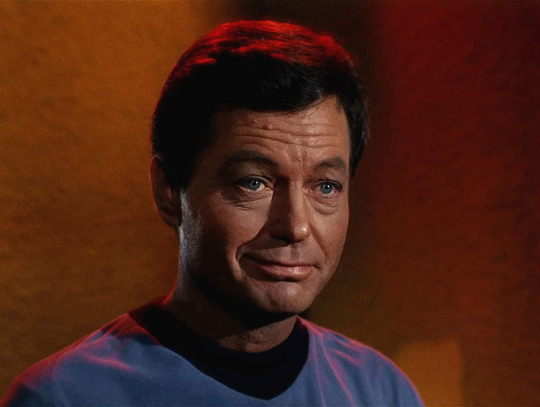
McCoy is all hot-blooded human, the third of the main Power Trio. An old-fashioned competent doctor who wasn’t entirely thrilled with deep space, McCoy is a deeply emotional character, duty-bound to follow his morals. He clashed with Spock regularly, routinely criticizing him for his perceived lack of emotion. Despite the fighting, McCoy respected Spock greatly, counting him as a close friend, despite their arguments and different perspectives. A cantankerous pacifist (though not above getting into the action when needed), McCoy is a Super Doc and a Sarcastic Devotee, a Grumpy Old Man who serves as the Heart to Spock’s Brain (hah!), a man who values Honor Before Reason who values the Good Old Ways. He’s a Determined Doctor who does everything he can for his patients, and a Deadpan Snarker to the point where he can match Spock in verbal sparring.
Bones represents the unpolished rawness of humanity, getting carried away with his emotions sometimes, but always with the best intentions. Another Jerk with a Heart of Gold, McCoy’s gruff nature accompanied a deeply moral man, very concerned with human empathy and doing the right thing. No philosophical discussion was complete without McCoy’s two cents, telling Kirk what he thought the right thing to do was. He was the quintessential Knight in Sour Armor, who would follow Kirk to the ends of the earth, complaining the entire way.
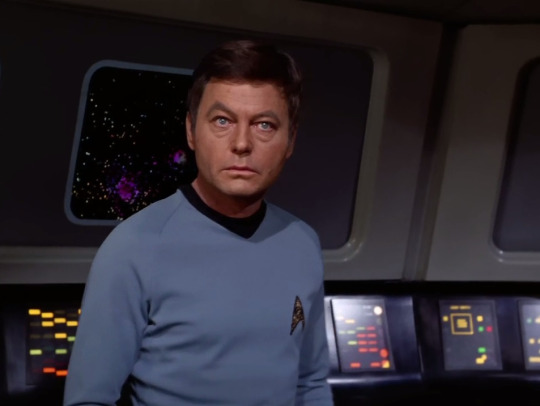
Despite the fact that he’s not as well-known as the other two members of the Power Trio, Bones was a vital component to the True Companions dynamic. His Vitriolic Best Buds relationship with Spock made up one of the most interesting and compelling dynamics on the show, serving as perfect counterbalances to one another. However, although his most famous role in the show was arguing with Spock (and delivering phrases such as ‘He’s Dead, Jim’), there is another, equally important position that he held in the trio.
McCoy served as a foil to Kirk, as well as one to Spock, a confidante, a close friend, providing perspective. While Spock was focused on the logic, Kirk on the best thing for the mission, McCoy’s focus was purely on the ‘patients’, the people, the right thing to do. No matter the situation, McCoy was the closest to empathy with the people involved, and provided the audience with another surrogate, saying the things that the viewers are thinking.
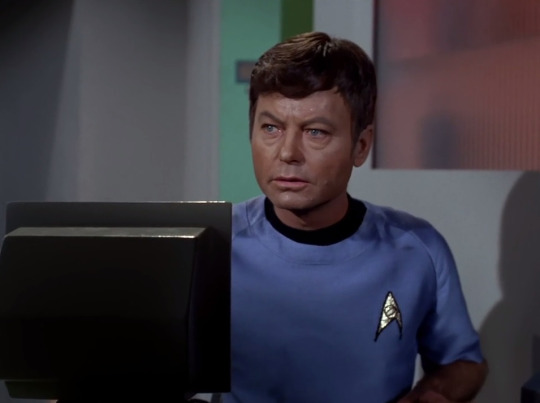
While not being a terribly big fan of space (and liking transporters even less), Bones was the epitome of the Frontier Doctor to the stars, taking care of every patient, even if they weren’t humanoid (Devil in the Dark) or a heavily pregnant woman who refuses to listen (Friday’s Child). McCoy was painfully human, reminding us of our most problematic traits while also holding onto that wild, fiery compassion that made him so incredibly humane, relatable, and understandable, making him just as vital to the Enterprise and her crew as Kirk or Spock.
The trio worked best together, providing a perfect main cast for an audience to follow. The formula was an interesting one, allowing the audience to hear separate viewpoints and ideas, listen in to the philosophical banter, and truly feel the strong friendship holding the leads together. The dynamic between them was powerful, an extremely vibrant bond that connected all three very different characters.
The result? Extremely dynamic characters that remain iconic and memorable even to this day.
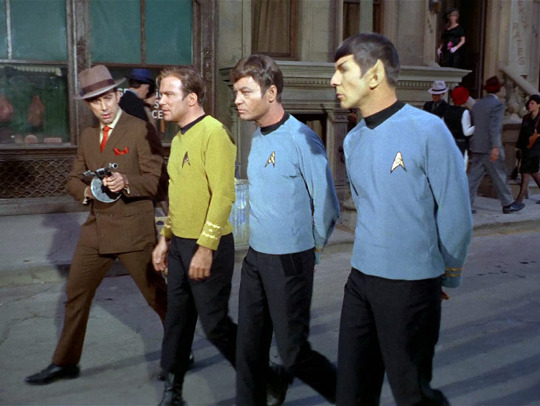
But the cast didn’t stop there.
The other characters of Star Trek, while not quite possessing the pop-culture iconography of the main trio, still hold their own rather impressive cultural footprint.
None more so than the chief engineer, Montgomery Scott.
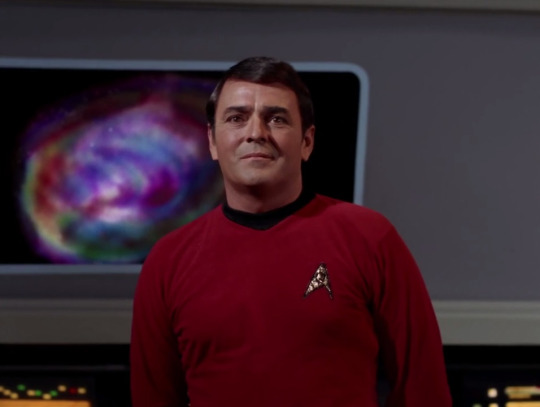
Scotty’s job was to be a miracle worker, solving impossible problems in impossibly small amounts of time. Whether it was the transporters, the phaser banks, the shields, or the engines, Scotty was the man for the job. Nobody had a better understanding, or love for the Enterprise than Scotty (except maybe Kirk). He was the king of outside-the-box solutions, and had the Enterprise jury-rigged to push her past her limits more times than can be easily counted. As the name implies, he was also Scottish, and extremely stereotypically so. Kilt, whiskey, haggis and all, Scotty was extremely proud of his heritage (though not quite as much as Chekov). Fitting the traditional stereotypes, Scotty had a fiery temper, with a Berserk Button triggered by any insult to the Enterprise. A Gadgeteer Genius (and the inventor of Scotty Time) as well as a Genius Bruiser, Scotty was both the brains and brawn, more than capable of holding his own in a fight, or thinking of a new, creative way to push the Enterprise past her capacity.
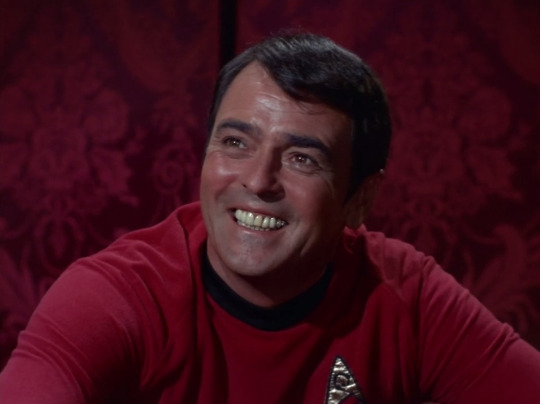
Scotty also held the distinction of being third in command, routinely taking the Captain’s chair when both Kirk and Spock were in the landing party. He was also the focus of a few episodes, making him a rare character with a Day in the Limelight, with episodes such as Wolf in the Fold, The Lights of Zetar, By Any Other Name, and The Trouble with Tribbles giving him a little more screen time and story than is typical. Scotty was an indispensable member of the crew, a life-saver on more than one occasion, and another of the legendary, iconic characters of the original Star Trek.
But it didn’t stop there.
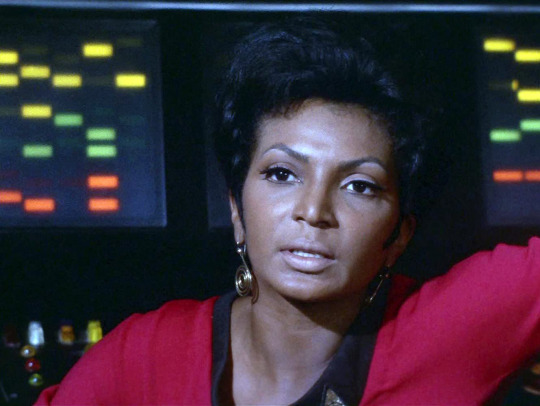
Lieutenant Nyota Uhura was another prominent character. As the ship’s communications officer, she codified the term ‘Bridge Bunny’, although she proved herself far more useful than she’s typically thought of. Whenever given the chance, Uhura is a capable Action Girl, intelligent, witty, and good at her job, being extremely fluent in multiple languages. She too got her days in the limelight, with episodes such as Mirror Mirror, The Gamesters of Triskelion, and The Trouble with Tribbles giving her more to do than just sit at her station and say ‘hailing frequencies open’. Uhura was Silk Hiding Steel, not typically in the heat of the battle, but tough as nails when she had to be. (I’ve talked about Uhura’s extensive influence on the real world in the Legacy article, but even that doesn’t scratch the surface of what Uhura’s impact has been.)
There were others on the bridge crew of equal importance, including the ship’s helmsman, Hikaru Sulu.
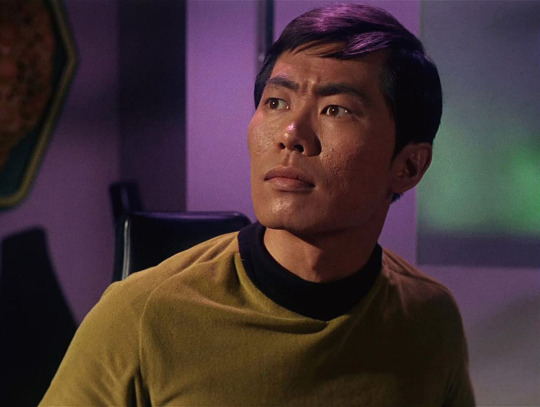
Sulu was a level-headed officer, amiable and cultured, with an extensive knowledge of botany, fencing, and antiques. Yet another Deadpan Snarker (it must run in the cast), Sulu is another Genius Bruiser, as skilled in fighting as he is in his piloting, with a great sense of humor. He is given special attention in episodes like Mirror Mirror and The Naked Time (Albeit as evil, and Brainwashed and Crazy), but often got great character moments in multiple episodes (especially Shore Leave). A reliable officer and loyal to the core, he made an interesting character by himself, although he did end up forming a fun ‘Those Two Guys’ dynamic with the youngest of the cast, Pavel Chekov.
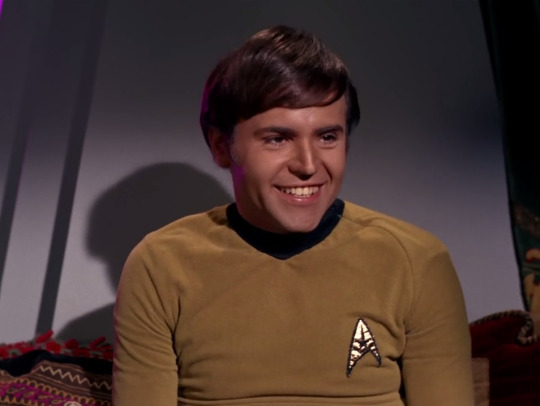
Chekov was introduced in season 2 as the navigator of the Enterprise. A bright young man with a fierce, passionate loyalty to Mother Russia (which evidently invented every good thing known to man), Chekov tended to be at the receiving end of a lot of the embarrassing agony in the series (mostly because Walter Koenig had a great scream). Also serving as a relief science officer, Chekov was plenty smart, if a bit of a Cloudcuckoolander, and the king of Cultural Posturing. Reckless and impulsive to balance Sulu’s calm good humor, Chekov’s temper tended to get the better of him. Like the others, he’s given a bit more screen time in episodes such as Mirror Mirror, The Trouble with Tribbles, The Way to Eden, The Deadly Years and Spectre of the Gun, but got to shine in plenty of other episodes, demonstrating his capabilities (despite being ‘The Intern’ and the Plucky Comic Relief) as a competent officer. Unsurprisingly, he was yet another Deadpan Snarker, lending his style of jokes well to bounce off of Sulu’s drier humor.
But there was more to the crew than the bridge.
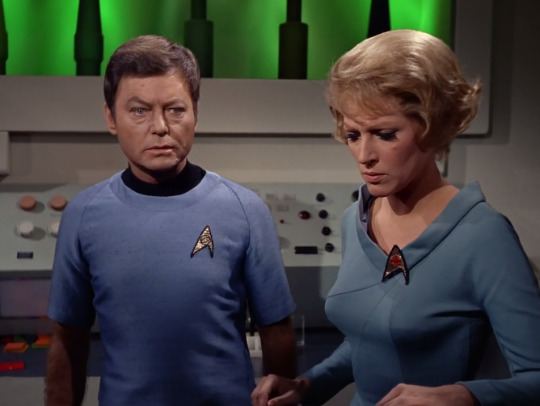
Another crew member of note was Christine Chapel, one of the nurses who operated in the sickbay. Chapel was notable for having an attraction to Spock, as well as being another in the long line of Enterprise Deadpan Snarkers. One of the most caring of the Enterprise’s crew, Chapel was given larger roles in episodes like The Naked Time, What Are Little Girls Made Of?, Amok Time, and Plato’s Stepchildren.
Arguably though, one of the most important characters in all of Star Trek was the Companion Cube: the Enterprise herself.
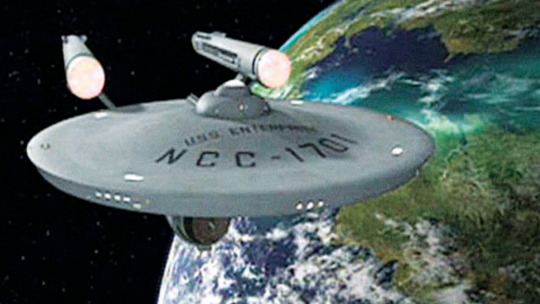
The Enterprise was one of the most powerful ships in Starfleet, a character in her own right. The epitome of the Cool Starship, the Enterprise was well known for Explosive Overclocking, and always coming through in the end (with a little help from Scotty). A Lightning Bruiser of a ship, the Enterprise became as legendary as her captain and crew, as beloved as the characters themselves to the point where one of NASA’s shuttles was named after her.
The characters of Star Trek are legends, both in and out of universe, and they are for a reason. No member of the crew is useless. Everyone has a purpose and a job to do, and each was distinct and unique. No two characters were the same, and each brought their own special personality and abilities to each episode they appeared in.
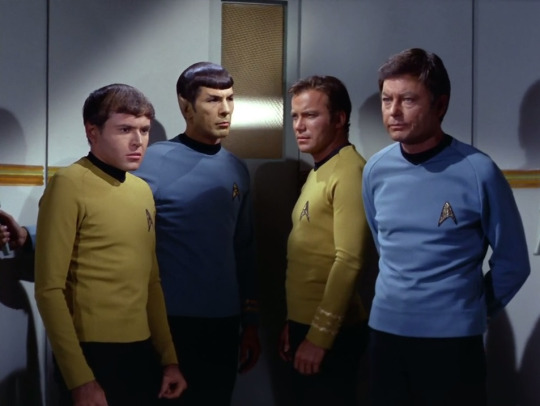
And that’s what made the drama of the show work so well.
Each character felt real, memorable and genuine. We as an audience worry for them with each danger, and cheer with each victory. We liked these people. We cared about what happened to them.
And they worked.
In each scenario and situation, the characters found new and interesting ways to deal with the circumstances, while never losing the core elements of their personalities. That’s important, hugely so. These characters were loved, and still are, for a reason. They work very well as characters, both in main and supporting roles, providing entertaining and compelling figures for the audience to invest in. The balance between relatability and entertainment was hit perfectly for every single character, allowing everyone to shine in their own ways in each episode. They felt real, and in the end, that’s the point of a character.
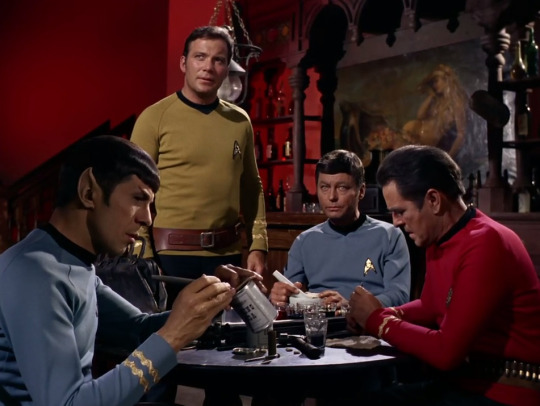
After all, one doesn’t get to be some of the most iconic television characters of all time by being boring.
Thank you guys so much for reading! Join us next time as we discuss Star Trek’s place in the times and the culture. If you have anything you’d like to say, don’t forget to leave an ask! I hope to see you all in the next article.
#Star Trek: The Original Series#Star Trek#TV#Television#TV-PG#60s#Drama#Action#Adventure#Sci-Fi#Science Fiction#William Shatner#Leonard Nimoy#DeForest Kelley#James Doohan#Nichelle Nichols#George Takei#Walter Koenig#Majel Barrett#Gene Roddenberry
133 notes
·
View notes
Text
C!SAM - Redeemable Qualities Analysis (Dream SMP)
Hallo! I’m back with another brain rot post for ya’ll instead of doing my schoolwork :]
Recently, I’ve been doing some thinking and theorizing with some friends on discord following Quackity’s huge lore stream (if you haven’t seen it, I highly recommend you watch it). I woke up this morning with a head full of many thoughts about C!Awesamdude and where his story could take us. Seeing as how there is going to be lots of change in the future with the server, there must be changes in these characters as well-- evil to good, good to evil, and the like. With these changes comes my thought: “can these characters be redeemed?” Here are my thoughts on how this applies to C!Sam.
Please let me know your thoughts and theories, I’d love to discuss with you! As always, strap in, it’s gonna be a long one :]
I hope you enjoy!
Author’s note: I want to start this off by saying that all of the contents being discussed are fictional, and are from the Dream SMP universe. I do not support the actions of these characters, but merely have interest in analyzing them through a lens of psychology and for entertainment purposes. Content of this post will contain spoilers up to 3/25/21 of the DSMP lore. I will also talk about ATLA a little bit ;)
Content warning: mentions of torture, manipulation, death, possible psychological trauma
(pls be safe ily)
What makes a redeemable character?
Redeemable characters are some of the most pleasing and favored characters in modern media. Their stories are rich with emotion, and they can even evoke some form of catharsis within the most skeptic consumers. Redeemable characters are memorable and inspiring, and without one, a story can feel empty. Before we apply this character trope to the Dream SMP and C!Sam, we need to answer a basic question in order to fully understand the complexity of redeemable characters and how they are so universally significant.
What is a redeemable character?
Simply put, a redeeming character or characteristic counteracts or corrects something negative. From a storytelling standpoint, a redeemable character is someone who has roots in good qualities, turns bad, and has the ability to revert their wrong choices to become a better person.
Examples of redeemed characters in popular media include:
Zuko - Avatar the Last Airbender
Boromir - Lord of the Rings
Kylo Ren - Star Wars
Severus Snape - Harry Potter
Zuko, for example, starts his story off as the villain. He tirelessly hunts down the protagonist, and will stop at nothing to achieve his goal to please his father. However, as the show progresses, we learn that Zuko wasn’t always bad. He was only driven to his path of villainy because of his fear of failure, of his father (the firelord and true antagonist of the show), and of a greater punishment than what he had already received. With the help of his uncle, Zuko learned to push through and accept his past, while also making amends with his wrongs and coming to the realization of who the true enemy was; ultimately choosing peace and unity over destruction and fear.
Zuko’s story is so appealing because it was drawn out. It was raw, it was real, and it was a genuine telling of how damaged people can heal, change, and come to accept themselves. Because he went through the process of redemption, he was not only able to be loved by those around him, but also by his audience-- And I believe that this can be the same case with any redeemable character.
So how does this relate to C!Sam? How could he possibly be redeemable if he is not evil?
C!Sam has become increasingly interesting to me in the DSMP lore, and he has shown how complex his character is-- in contrast to many first impressions that people have of him. Based upon his actions from the past, and his willingness to remain neutral in times of conflict, we can conclude that he sustains both “neutral good” and “lawful neutral/good” qualities. This means that Sam is a reliable character, driven by his own personal values, and is devoted to helping others (when he sees fit). Evidence of these qualities emerge…
When he sided with Pogtopia during the Manberg War to maintain good relations with Tommy and Tubbo.
When he saved Hannah from the Egg
Created Sam Nook to assist Tommy in building his hotel
Built Pandora’s Vault for Dream
Showed concern for Ranboo after one of his denied prison visits
Sam’s moral code is deeply rooted with good intentions; he keeps an eye out for his friends, maintains his relationships, assists in builds/projects, and also serves as a “stable adult figure” for some of the younger members of the server. In contrast to his logical outward appearance, C!Sam lets his emotions drive his decision making-- which can lead to many severe consequences depending on how he acts. However, recently Sam’s actions indicate that he is experiencing a flip in morals.
Below are incidents that have led to C!Sam’s recent change in moral code.
Incident 1: Trapped with the Egg
Many weeks ago, during the height of character involvement with the Egg lore, C!Sam was lured into a trap by BBH and Antfrost. He spent about a day trapped in close contact with the Egg, and after he was saved by Puffy and Tommy, he was clearly changed. It is likely that the Egg is behind these sudden changes in character motivation for Sam… similarly to how it corrupted BBH, Ant, and Punz. Whether this is the case with Sam is unclear.
Incident 2: Tommy’s death
C!Sam and C!Tommy’s relationship within the DSMP lore is one of my favorite things to talk about. After his victory over the disk war and finally landing his nemesis in prison, Tommy was left empty, without much to do. He decided to take upon a new project to incite a new era of peace, and was able to enlist the help of Sam with building his hotel. Throughout this process (and under the watchful eye of Sam Nook), Tommy and Sam were able to develop a bond with each other through their work, along with their interactions at the Prison.
Sam has made it clear that he intends to defend Tommy no matter what-- but after his untimely death at the hands of C!Dream, Sam was deeply wounded. He felt as if he failed his promise to keep Tommy safe, and he made it clear that the blame for the “security issue” and C!Tommy’s death should be placed fully on him. No matter how selfless and responsible this makes his character appear, this event will only serve as the basis for severe consequences in moral change in the future.
Incident 3: Confrontation with Quackity
Following the large emotional impact of Tommy’s death, C!Sam is very vulnerable, because he is still within the stages of grief. C!Quackity came to Sam for a partnership, to take advantage of Sam while he was low to gain the upper hand. It’s no question that Q’s character is a talented manipulator, we can see that clearly in his interaction with Sam. Q restates again and again that Sam failed, further cementing Sam’s existing guilt and desire for revenge for his failure. Sam gives in to the manipulation, and somewhat reluctantly allows Quackity to torture Dream to get information and to get payback for what he did to Tommy... which completely goes against what his responsibility of Warden entails.
As Warden, C!Sam is supposed to uphold the law and rules of visitation, but because of his leniency with Quackity (in breaking the rules) and because he is still emotionally raw, he no longer defends good from evil, but is now biased against it. C!Sam probably wants Dream dead, but as Warden, his opinion shouldn’t matter. Because Sam fully blames himself for failing Tommy, he's lost the "lawful good" in his character, meaning Warden Sam (as a set of morals) truly doesn't exist anymore.
Incident 4: Ponk’s mistake
To recap a stream briefly, Ponk did a prank on Sam a couple days ago, and stole a few of the expired keycards to Pandora’s Vault. Rightfully, Sam was very angry, and not only took back the keycards, but also imprisoned Ponk. However, where this interaction should have ended, C!Sam only took it to the extreme. (TW!!!!) Out of anger and frustration, C!Sam tortured Ponk for his wrongdoing by setting him on fire, and amputating his arm (END TW!!!).
This only proves my point from Incident 3. Warden Sam is fading, only bits and pieces of his morally neutral character remain within him for basic tasks. His encounter with Quackity had a huge impact on his psyche, not only is he allowing the torture of the prison occupants, but he is doing it himself as well. C!Sam is now starting to believe that pain and torture are the only solutions for punishment, which is the complete opposite of what he believed before Dream was imprisoned.
In short...
C!Sam is losing his grip on moral and mental stability because of his emotional insecurity due to his psychological trauma. Because of this, I believe that it is entirely possible for Sam’s character to explore the route of evil and unlawful values-- which furthers the possibility for a redemption arc. Even currently, Sam is eligible for redemption as well.
If C!Sam is willing to acknowledge his wrongs from today and improve himself upon them, he will likely become a more memorable, lovable, and even more human character than we’ve seen in the SMP before.
SIDENOTE!
IRL Sam recently posted in his discord talking about his character. Here are a few key things to keep in mind as the story goes forward:
“There is a LOT of things in the plan for me as a character and a very big change is coming about for me as the story moves along.”
I believe this change could be a villain arc, or a turn towards evil that incites the possibility for redemption.
“My character is playing a role that I think is VITAL for the server and a role that I like to think was a good one for me to pick up and accept.”
You can read the reddit post I referenced for this here (ty to my friend on discord for providing me with the link <3)
TYSM FOR READING!! <3 <3 <3
#dreamsmp#awesamdude#ponk#tommyinnit#tubbo#mcyt#captainpuffy#dsmplore#dream smp lore#dream#dream smp analysis#QUACKITY#my work
32 notes
·
View notes
Note
Scriptliss x Protagonist? (not the reader tho,, the character)

(Note: as you can see, this isn't a "x reader" thing, the protagonist and the reader (for me) are separate people, like the reader controlling protag, and in the ending he finally does his own choices, so please don't hate this). (2: i will stop putting the titles of every story oof).
The protagonist finally asks Scriptliss for a date, which he gladly accepts.
Protag threw everything out of his closet, trying to find something he liked. after all he would try to impress his bff n' crush.
He taked a deep breath, nervous and almost regretting everything. Cursed the moment he asked Scriptliss for a date.
He looked at himself in the mirror, and smiled. There was no going back, he wished with all his might not to fail as usual.
He took out his keys and opened the door, took one last look at his house and he filled himself with courage.
"I'm ready"
. . . . . . . . . . . . . . . . . . . . . . . . . . . .
Protag looked up at the sky, sunny, radiant, beautiful, perfect for his date.
In a way, this moment reminded him of the first time he came to this place, sunny and radiant, as if nothing was happening, he met Aaron, the narrator (and who knows if he is narrating this now), He crossed on a boxdragon, and there for the first time he met..
— Protag, over there! —.
Scriptliss.
And then he saw him, meeting the demon, he looked beautiful, although the only difference was that he had a red pullover instead of his short shirt, and he also wore boots instead of leaving his feet bare with his pants, and speaking of pants, it was still the same.
But for him it would always be beautiful.
— Be careful of what you imagine, Protagonist. — something appeared behind him.
— Oh sh- Cogen! —.
Protag almost screamed, he didn't expect Cogen to be here.
— Sorry about Cogen, I had to bring him, or he will get into the personal lives of others. — Scriptliss grabbed Cogen, pulling him away from the gray boy. The floating diamond, still without a face, seemed somewhat insistent. — So.. where do we go, mister dating?
— O-oh, yeah. I was thinking of going for a walk, having a smoothie, watching the sunset... basic things. — protag laughed, nervously.
— hey, i like that last idea. Let's go. —.
the demon took the hand of the colorless one, causing him to finally have colors on his face, specifically red.
He felt like he was exploding inside, and Cogen probably reading his thoughts didn't help.
. . . . . . . . . . . . . . . . . . . . . . . . . . . .
— Don't worry Antagmom, i know how to take care of a child. —.
— No, you don't. — Scriptliss yelled, getting a bad look from dusekkar, then running away along with Protag.
— Why did you said that? — .
— Well, when i was a kid, Dusekkar took care of me for a while. Obviously everything went wrong, and now I have a scar on my back. —.
— I'm not going to ask what happened to you. —.
They both walked into an ice cream parlor, ready to order a milkshake rather than just ice cream.
— What flavors do you want, Protag? —.
— Difficult to choose. Maybe... just strawberry chocolate. —.
— Cool. Me too, please. — He smiled, confident of himself, but there was something that made Protag suspicious.
The worker just nodded, opening a refrigerator to get milk, and the chosen flavors.
Protagonist saw a poster out of the corner of his eye, apparently they also sold milkshakes with two straws. Scriptliss noticed that.
— Oh, hey, you want a milshake with two straws? Some Robloxians say that two people can drink the same shake, and that it is even bigger. Isn't that awesome? —.
— You didn't know? —.
Scriptliss stopped smiling, somewhat embarrassed.
— Well... being locked up for a long time makes me miss a lot of things. —.
The protagonist thought about it, and it was true. Scriptliss being locked up for so long he missed many things, all the experiences he lost... he will help him to regain everything.
— Well.. what if we... *gLUp* take the milkshake with two straws? — and then he got hit by Cogen. Absolute worthy.
— Really? thanks, thanks! — Protag now is blushing like a crazy, because Script just hugged him. — hey uh... sir? — Apparently he wanted to get the worker's attention, which worked. — We will take the milkshake with two straws.
For some reason, he was very happy about this. Although little did he know of the truth, that everything had been planned by Scriptliss.
. . . . . . . . . . . . . . . . . . . . . . . . . . . .
After drinking the milkshake and the protagonist almost had a heart attack because he was so close to Scriptliss, sunset finally arrived, and both lovebirds were heading to the closest hill in the new part of the city, with a spectacular view. Cliche and romantic in its own way.
They both sat, gazing at the beautiful view, the sun gradually setting to show its bright stars and a beautiful moon will show.
Again, the protagonist looked to the side, this time focusing on Scriptliss's hand that was a few meters from his. It was so tempting to entwine both hands.
But he had to take the first step if he wanted to have something with the demon.
He closed his eyes, and let himself be carried away. He brought his fingers to Script's hand, feeling the touch of the other that made him feel like an entire zoo was in his stomach.
Then he felt how the other's hand acted on its own, grasping and entwining both hands.Then, very shyly, he looked at his partner, who was smiling at him in a sweet and pleasant way.
Quite a contrast to the Scriptliss he saw the first time. The therapy was effective.
— U-uh, OH, sorry, i- i didn't mean to.. —.
— no, no, it's okay. — he smiled, again. The protagonist swallowed hard, he could feel the words climbing up his throat to come out and confess in one go.
But it was now or never.
— Hey, Script. I have something to tell you ... — Protagonist murmured, lightly squeezing the demon's hand. — I... I.. —.
— He has a crush on you. — F*ck you, Cogen.
— HA!? — Boom, protagonist died (only inside).
— ... it's not a surprise. —.
— WAH!? —.
— what? — Scriptliss giggled. — you're pretty obvious. —.
— bu... but.. you know it all the time? —.
— It took a while, even if everyone insisted that you liked me, I refused to believe them. —.
— but.. why? —.
— I find it hard to believe that someone amazing likes me. — Scriptliss giggled, again, making the colorless one feel weird. — Besides that I thought that everyone wanted to play with my feelings. —.
— Did they want to make you think that someone finally loved you because you think nobody loves you? motherf-.
— no silly, what i'm trying to say is that... i like you too, protag! —.
Protag just stared at him, then he finally talks.
— li-like.. you love me? —.
— Yeah. — Scriptliss blushed, playing with his fingers and looking down. — Really ... you started to interest me after everything that happened, you were always there when I needed a hand, you were there when I was crying for Tess's message, you accompanied me in all my therapies, and I never thought I would find someone as good as you. Someone finally made me feel so... secure about myself for a long time. Protag i.. are you crying?
— yeah... nobody ever told me those things. — he sobbed. — you're so good, a-and pretty, and a really good friend, but i hate being friends because i want to be something more than friends with you. —.
Scriptliss now was the only staring, speechless.
— So.. — Scriptliss recovered, putting his arm under the arm of the protagonist. — Do you want to be more than friends? maybe.. a couple? —.
— ...yeah, i really want to be with you, forever. —.
They both joined their foreheads, because they were both terribly shy to give the first kiss. Still, they were happy, especially the protagonist, to finally be able to confess his feelings (although Cogen has done it before) really relieved him a lot. Now he couldn't regret anything.
Let the moonlight witness the new love that blooms in the hills.
. . . . . . . . . . . . . . . . . . . .
extra: After leaving the hill, holding hands, they go for a walk, the first walk as a couple. On the way they met Antagon, Dusekkar and Lanter. The latter basically took them for some reason. In the middle of the drag, they both reveal their new relationship to Lanter and he congratulates them, then leaves to tell everyone. Everything went well.
#super paper roblox#spr#scriptliss#protagonist#Fun fact: this story is connected with the one#because i will kinda start connecting stories heck yea#since this request was before the antagon's one#i connected these two#that's why Script and Protag did a cameo in the other ;)
12 notes
·
View notes
Text
Dean Winchester, Character Death, and Frodo’s Return to the Shire
This will be a LOOONG post that has been stuck in my head for a while in bits and pieces - about Dean’s death, what it was and what it wasn’t, and incidentally, the Lord of the Rings has found its way in here too.
It’s pretty clear that Dabb always meant for Dean to die.
And while I strongly disagree with that, on so many levels, I think it might have been more palatable if framed in a different way, and so I’ve been trying to figure out what the ending might have looked like in a world that wasn’t quite as shitty as ours. Still shitty, but marginally less so.
Dean is notoriously bad at letting bad things happen if he can prevent them. I find it difficult to believe that Dean would ever quit hunting entirely, and for as long as he kept hunting, the danger of dying would always be present. It’s not unrealistic at all for him to die on a routine hunt. Life is unpredictable; life as a hunter, even more so. I understand that the writers might want to make that point. And it might have been valid if – and that’s the real problem – Dean’s death hadn’t otherwise been devoid of meaning.
The thing about character death – any sort of character death – is that it needs to have purpose.
And there are different ways that it can have purpose, but it depends on what sort of character we’re talking about.
Minor, often unnamed characters – the redshirts in every narrative – die to illustrate injustice or to highlight evil. Their death is a catalyst or a consequence of the events as they unfold, part of the conflict the heros have to solve. An army led into battle by a tyrant. Refugees in a camp dying of malnutrition. Murder victims of a serial killer. In all these cases, death fuels the plot but has little meaning beyond that.
There are minor characters whose death both fuels the plot and gives the hero a more personal motive to act. Supernatural is full of these. Mary and Jessica burning at the ceiling; Charlie dumped in a bathtub. Minor characters can have their own arcs, but ultimately their deaths are only important for the impact they have on the main characters.
The death of a protagonist is markedly different. Protagonists need to have agency even in death to maintain their status.
Their death has to be the reflection of their character development up to that point but it also has to tell us something about them that we did not already know – show us how they make a final decision or draw a final conclusion that marks the end of an inner conflict – which is what all storytelling is about. Character death has to serve a purpose to have meaning, and for a protagonist, the purpose must be personal.
And If it fails to do that, then that’s either a sign that we’re no longer dealing with a protagonist, or that something weng very, very wrong in the writers’ room. There is no inherent value in tragedy. In storytelling, tragedy is justified when it achieves something, otherwise, it’s just capriciousness.
Buffy’s death at the end of season 5 of BTVS is a classic example for the death of a protagonist. Harry’s decision to go and face Voldemort in the forbidden forest, even though it doesn’t ultimately kill him, is another. When Sam jumps into the abyss in Swan Song, that is his heroic sacrifice, but if he’d permanently died in season 2, that would have been bizarre and nonsensical because it was entirely beyond his control – it did not reflect his decisions, gave him no agency, and reduced him from a protagonist to a side character. In that moment, his death was something that happened to Dean. It worked because his death didn’t stick – he regained his agency after resurrection. But as an ending to his hero’s journey, it would have been singularly unsatisfying.
Dean is our protagonist, and he has been for 15 seasons. What does his death tell us about him that we didn’t know – what decisions did he make, what inner struggle got resolved, what meaning did his death have for him, personally, and then, in extension, for us?
The problem is that the finale, as is so often the case in Supernatural, tells two stories at once.
Whe the episode starts, it appears that Dean moves on with his life just fine, a well-adjusted model citizen. He’s ready to get a job, seems to be moderately happy. He even has dog. The decision to keep hunting is his, and death just accidentally happens, which of course is not unrealistic in his line of work. On the forefront, his death is brought about by the fact that he exercises free will. It tells us that he is a hunter and will always be one, that he keeps protecting people because that’s just who he is.
None of that, however, is new. It is just more of the same. All of Dean’s decisions in the finale tell us nothing about him that we did not already know. He’s trying to move on from the death of the people closest to him, as he’s always done. He chooses the hamster wheel, as he has always done. He follows in his father’s footsteps, as he has always done.
As he gets impaled, he has no choices left to make. There is no agency in his death, no inner struggle. His death furthers neither his character development nor the plot. That Dean simply accepts his death is as unsurprising as the fact that his final moments are spent reassuring Sam and telling him that he has to keep fighting.
The conclusion? Dean ceases to be a protagonist.
He dies not as the hero of his story. His death just happens to him.
After Sam and Dean had presumably freed themselves from the constraints of Chuck’s narrative, the final episode should have emphasized their agency, their freedom of choice, through change. But in the end, it only led them both to making the same choices as always, the unsurprising ones. And even the choices that did indicate a change (like Dean’s job application) were not shown to bear fruits.
What meaning does free will have when it doesn’t change the outcome? All the finale does is tell a bleak story about humanity and how we are incapable of making meaningful, consequential changes in our lives.
It’s almost like Lucifer is talking to us all the way from the Endverse of 5.04: “Whatever you do, you will always end up here. Whatever choices you make, whatever details you alter, we will always end up – here.”
Devastating as that is, there is another interpretation of the finale that is arguably worse, a different reading strongly suggested by both text and subtext.
Dean, as mentioned before, is trying to move on with his life but ultimately fails. The situation is different from the way he behaved when he lost Cas and Mary in season 13 where he was outright suicidal – his desperation is more quiet but also more profound. He seems determined to honor Cas’ and Jack’s sacrifice. But determination is not enough. Dean only goes through the motions, and it shows. He clings to the dog in the morning; the dog sticks to him closely throughout the day as dogs tend to do when they feel that their owner is in distress, almost like a therapy dog. His room looks messy, he makes an attempt to fix it but then abandons it as it requires too muh effort. Ultimately, he can’t be bothered. There are alcohol bottles standing around, a sign that he’s drinking, though not as heavily as in the past. All the while, he sems very laid-back, presumably relaxed and at peace and coping well with the loss but also weirdly detached.
When Sam mentions Cas and Jack at the pie festival, he says, “Yeah, I’m thinking about them too. You know that pain’s not going to go away. Right? But if we don’t keep living, then all that … sacrifice is gonna be for nothing.”
He feels an obligation. And he’s trying. It’s just not working very well.
He barely reacts when Sams pies him in the face.
When impaled on the rebar, Dean actively prevents Sam from calling for help. He tells Sam not to bring him back. And in the end, he asks Sam to tell him it’s okay to go. Which isn’t something he would do if he was simply dying – it strongly indicates that he wants to be allowed to die.
Prompting the conclusion that Dean is giving up on life the first opportunity he gets, not even knowing whether he’ll end up in heaven.
In this reading, Dean does have a little bit of agency. He makes a decision, sort of. His death marks the resolution of an inner struggle: He gives up.
He dies as a protagonist.
In the worst way possible.
In all honesty, I can’t decide which interpretation I hate more.
But what could the writers have done differently, if Dean was meant to die all along?
Back when the SPN finale had freshly aired, I was describing it like this:
Imagine that the One Ring is destroyed. But Merry died in the battle and Pippin went missing and was never found again. Frodo and Sam return to the Shire; Pippin and Merry are mentioned once in passing. Upon their arrival, Frodo is attacked by Wormtongue and slowly bleeds out over the span of thirty pages. Sam marries someone else than Rosie; Rosie is never mentioned again. Somehow, both Frodo and Sam are teleported to Valinor, where we are told that the real fun begins.
At the time, I only used this as an example to illustrate what a mess the finale had been. But in the weeks that have passed since, then, I’ve started thinking about the LOTR comparison some more, and it got me thinking about Dean’s death in a different way.
And it has everything to do with the difference between running from and walking toward.
As mentioned before, it’s not unrealistic that Dean would die on a random hunt. Would the Dean Winchester we know ever stop hunting? Maybe. We might want him to. Then again, would be still be Dean Winchester if he did? We know that Dean can’t help but feel responsible. He is someone who is incapable of staying hands-off.
Dean, as we see him in the finale, is trying to honor Cas’s and Jack’s memory by living, although he’s not very good at it – not outright suicidal but worn-out. Exhausted. And still he makes the decisions to keep hunting because he can do nothing else.
When Frodo and Sam returned to the Shire in LOTR, they had earned their happy ending. But Frodo, who had carried such a heavy burden that he was permanently altered by it, could no longer find happiness in Middleearth, and ultimately decided to depart for Valinor along with Gandalf and Bilbo with the promise of later being reunited with Sam. The journey had changed both of them, but it had changed Frodo to a greater degree, his responsibility had been greater, the weight on his shoulders heavier.
And I started to wonder whether the intention had initially been to show Dean in much the same state – and to frame his death as a decision to move on, the same way that LOTR has Frodo move on to the West.
Imagine the following: Cas is pulled into the Empty. His happiness and love change the Empty; he merges with it or otherwise changes it so that it’s now a more demon-friendly environment. Everyone there is at peace. Cas, in whatever form, moves on to Heaven – or maybe his soul does as it’s now mostly human.
Dean goes on a hunt and dies. Jack, or some other entity, shows up where you would expect the curiously absent reaper in order to give him a choice. Learning that Cas is in Heaven, and knowing that he will never be able to stop hunting if he remains on earth, Dean makes the conscious decision to move on. For the first time, Dean prioritizes his own happiness over his perceived duty. His death is no longer suicide by proxy, and neither is its sole purpose to illustrate the inherent meaningless of free will by turning him into a hamster-by-choice. Instead, it becomes a decision because he’s given back agency. He resolves an inner conflict and there’s even a final bit of character development as he breaks the chain of mutual co-dependency that ties him to Sam and allows himself to be with Cas. He remains a protagonist throughout the end.
And because he acknowledges his love for Cas and decides to be with him, he no longer just runs from, he walks toward.
The parallels to The Lord of the Rings get even more obvious when you take Sam into the equation because much like Samwise, Sam remains on earth in order to have a life that, for him, still holds meaning and the chance of happiness – whereas Dean can no longer be happy on earth as long as Cas isn’t there.
To be completely clear: I’d still think that such an ending would suck because it puts too much emphasis on an afterlife, and it would still send the message that characters like Dean could only find peace in death, and unless some adjustments were made to Sam’s arc as well, the ending would still suck for him.
But seeing as SPN plays in a universe where an afterlife exists, I could probably learn to live with Dean’s death if it had any sort of meaning, for him, besides dying and waiting for Sam to arrive, if it allowed for that final bit of character development. If he got to choose.
While I’ll never be able to see the finale that we actually got as anything but a complete atrocity.
34 notes
·
View notes
Text
Congratulations, We Fell for Another Love Bombing or Thank You, Disney, You Did It Again
Sigh.
Luke Skywalker is back.
And Din Djarin and his child had to say goodbye.
I never thought I would curse and say “Oh no!” when Luke appeared in that fateful corridor.
I wonder why the Disney studios are doing this - trying to "make up” for the oh-so criticized sequels, I suppose?
The Jedi have made their time. It was shown and proven over and over again that their attitude is wrong and needs to change, and Luke was the last of the old school Jedi. Again, a Force-sensitive child is all but kidnapped by a Jedi: he obviously did not like to go. Mando is no longer the hero of the story, he was stripped of his agency and all of his personal choices were questioned and valued for null and void. But the Dark Saber is in his hands now, so he’s the heir to the throne of Mandalore I guess. Like he ever wanted that.
This show, which grew to be so well-beloved in only a few episodes, now is not “The Mandalorian” any more. Its new title is “Luke’s Skywalker’s Comeback”. Hardcore fans may be out of their minds with joy, but for us, who admired Mando both as a badass hero and as a father figure and loved the dynamics between him and Grogu, the whole purpose of the show is destroyed. And here I naively had thought The Rise of Skywalker was bad enough to teach the studios not to repeat its mistakes.
~~~ more under the cut ~~~
Star Wars ought to be a fairy tale. It is and always was one. I can understand that the prequels had to end in a tragedy, we all knew that from the start, but why the sequels? And now, why must this generally acclaimed and beloved tv show again appease hardcore fans of old with Luke coming to save the day, cancelling in a matter of minutes what the story had built up within two entire seasons - the relationship of the two protagonists, heart and core of the narrative, as it had been with Rey and Ben Solo? And when both of them had their relationship just getting started - Rey and Ben kissing, Din calling Grogu by his name and the latter seeing him and touching his face? Why make Rey a queen without her king, and Din a father without a son?
Again, a Force-user is denied having a home: „Jedi training” matters more. By Luke of all people, the guy who never was trained in the first place (only very briefly), who except for a few lessons with Obi-Wan and Yoda was self-taught in the Force, and never understood that his strength lay with his compassion and his connection with other people, not with his alleged „superpowers”.
Think back to how Anakin, Luke and Rey were before they met the Jedi: unaware of their powers, compassionate, idealistic, brave. The Jedi mindset tainted their characters and lives, making them believing that they are (or have to be) untouchable and invincible, compelling them to live for duty instead of love, condemning them to a lifetime of loneliness. Will the Jedi never learn?
Though I practically grew up with the classic movies, I loved The Last Jedi; I can accept that Luke failed, and also that Han and Leia did. Nobody is perfect, and the Jedi mindset as well as the universally accepted idea that „Jedi” is a synonym for infallible saint-like hero was wrong in the first place, else the Empire never would have risen. Making Luke not the cavalry who came to save the day - until the battle on Crait, that is - but a man who failed and picked himself up again was much more meaningful, and I know not a few fans who felt inspired by this. Luke had saved his father choosing love over power, not the contrary. Some fans just never get it. To appease them, why not simply give him a new storyline of his own, instead of making him intrude in other Star Wars related shows? Why stop the new stories in their tracks just to bring him back?
Instead of seeing Luke as the grand kickass hero in a tv show that never had anything to do with him until now, it would have been more to the purpose to finally shed light on the thirty years between his father’s and his nephew’s death, to explain us where the Jedi and the Skywalker-Organa-Solo family failed to make such an outcome possible - the granddaughter of Palpatine taking over with their own blessing. There must have been a huge build-up between the end of the original saga and the fateful night at the temple when Luke briefly panicked looking into his nephew’s mind. Many fans still are convinced that „Kylo Ren just chose to be bad” because we hardly know how the relationship between these two was in the first place. (A very easy plot twist would e.g. have been Snoke warning Ben that his uncle sooner or later would turn on him, frightened by his power. The fulfilment of that prophecy would have made the night at the temple much more impactful.)
I understand that the studios want to tease us, to make us watch the other shows, too. But honestly, I’m getting tired of feeling duped. Tired of getting attached to new heroes to have their purpose smashed just so the Star Wars dudebro fans can sleep quietly at night because „some Jedi will take care of it”. First the characters from the sequels, now the ones from The Mandalorian. You get to love the new characters, you root for them to find happiness or at least some closure, and then, at the last moment, poof!, the hero of old comes back and the story development stops right there.
It is not right and it never was for the Jedi to take Force-sensitive children away from home, to enforce „you have to become a Jedi, like it or not” on them, to teach them not to have attachments, to make them focus on the Light Side thereby bringing the Force out of its much-needed balance. While Ahsoka saw that Grogu has formed a strong attachment to Din Djarin, Luke obviously did not, or he did not care. The irony is that he always wanted a father, and knows the pain of losing a father you’ve just found.
The Mandalorian felt like a consolation after Episode IX, a blessing for the fans for whom heart and soul are more interesting than nostalgia and „Jedi superheroes”. Now it’s just another kick in the guts. It’s painful and embarrassing to get to love characters so much, to get invested in their story so deeply, and then to realize again that they seem to mean nothing in the shade of the heroes of old. Ben Solo died young and miserable and Din Djarin and Grogu can now, I suppose, be miserable too. Can someone please explain to me why after the classics, no Star Wars film or show had an uplifting ending any more? With the possible exception of Solo, which was a nice filler but not a really important storyline. (I do not count Episodes I and II, they officially had a happy ending but it was tainted by the knowledge of what was to come.)
Fans are not blind. We saw the parallels between Darth Vader and Din Djarin as well as the differences - both being cool and tough but the latter not disdaining to be a caring father at the same time. The entire show lived from the dynamics between the gruff but kind bounty hunter and the innocent-looking powerful child, ever from the first episode. Two years of build-up for nothing, as it was with the four years of the sequels. Mando has to relinquish Grogu, Rey loses Ben. What was all that for? Both Mando and Rey are fighters, they have done nothing else their entire lives. What is to become of them now that they have nothing to fight for any more, nor anyone to live for? Except staying on a planet that is foreign to them and, for all they know, inhabitable or at least inhospitable?
With Rey and Ben Solo, the situation was different: she had proven good intentions but bad attitude (arrogance, violence, judgement) over and over, unable to deny her heritage, and even impaled her „antagonist” once while he was only defending himself. He had been the head of a criminal organization for years, and had committed patricide. Of course there are nuances to these characters and I still believe that they would have deserved another chance; I understand however that would have been unfitting to let the sequels end giving them a happy ending.
But in the case of Din Djarin, a man of honor, who has made friends and brought peace wherever he went throughout the galaxy? Grogu, the last surviving padawan of the old Jedi temple, who saved both his and Greef Karga’s life despite the danger for himself? What did they do to deserve being ripped apart like that?
So, all I can say: thank you, you did it again. And, once more, just before Christmas. I wish at least these depressing endings would be released at some other time.
I would dearly want to see a galaxy that finally learned from its faults, where family and attachments and Balance and free choice are not contrary to being a Jedi. I am in my late forties and I’m beginning to give up hope that I will live to see it. By now I am wondering whether George Lucas himself will live to see it.
I always loved Luke. He is one of my favorite heroes. But now he’s become an insensitive know-it-all who suffered from his own daddy issues to the point that he almost died crying out to his father for help, yet did not learn not to separate fathers from children and vice versa and, on the contrary, is doing it over and over again. He did not even tell Mando his name, or where he could reach him. We don’t have a clue as to if, when and how the Clan of Two will meet again.
I get it that since this show is set five years Return of the Jedi, it would have been difficult to ignore Luke’s existence altogether. And of course, we can rest assured that Luke will do his best for Grogu. But still: he has made his time. I wanted to see the new heroes going their own way, not hanging on the sleeves of the former generation. Mando is a man of honor, he had promised to bring Grogu to his own kind and he relinquished him despite his own wishes. (Not to mention that technically, since he identifies as a Mandalorian, by being a Jedi Luke is his enemy.) Why did Luke have to take the child away? His greatest strength always was that he was first and foremost himself and only in the second place a Jedi. What became of his trademark compassion?
Before The Mandalorian, we have never seen a healthy and working father-son relationship in the saga. It was incredibly refreshing and heart-warming to see these two traveling through the galaxy and living through adventures together; also, contrarily to Yoda, Grogu saw a lot of the bad things happening in the galaxy with his own eyes, which certainly was good for his character development.
But in the end, both he and his „father” did not go anywhere. Like Rey in Episode IX, they found a) power and b) a surrogate place, but neither got what was actually his heart’s wish - a home. I can’t understand why. Deliberate cruelty? We never knew whether Han and Leia and Ben felt how painful it was to break up their little family for the sake of „Jedi training”. You bet Din and Grogu did feel that pain and loss.
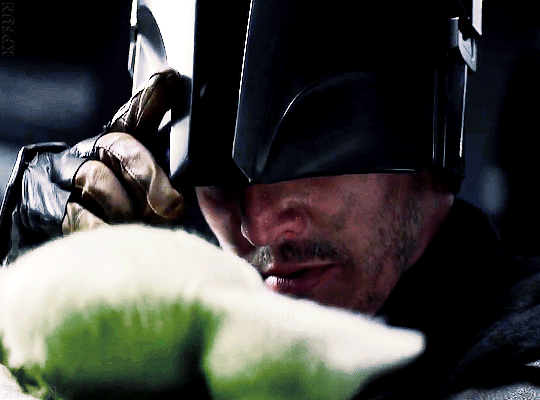
Both as a person with a heart and a brain and an almost lifelong Star Wars fan I am sickened by the readiness of the studios to end all that this well-made show had built up, for the appeasement of Jedi worshippers who just don’t want to see that the Jedi mindset needs urgently to change. It can’t be that difficult to renew them for the better; there is no necessity to erase the Jedi completely and there is nothing bad with making them grow wiser and stronger by finally understanding and accepting the importance of attachments and family ties. Yes, I realize that being a father also means learning how to let go; but here we are speaking of a literal child, not of a young adult who chose his own way in life.
I thought that George Lucas knew why he sold his franchise to the Disney studios, given their tradition in telling stories about family and friendship. This development is not a triumph, it is unworthy both of the studios and of the entire Star Wars saga. I’m tired of producers bowing down before fans who see every shred of the saga through „Jedi are always right”-tinted glasses respectively who value coolness over compassion even though it always was the saga’s central message.
Whatever happens in Season 3, countless fans will only be watching it asking, „Where’s Luke?” If Grogu should choose to join Mando again, everybody will be like, „But how can he want to leave Luke Skywalker of all people?” Some already see Grogu die prematurely, killed by the oh-so-bad guy Kylo Ren, for no other reason than to just to further prove how evil he is. In which case both Ben Solo and Grogu will have lived and died for nothing except for leaving a lot of heartbreak behind.
There must be another and better way to honor the legacy of both Luke Skywalker and the original trilogy than to think up new heroes and then destroy their purpose for the sake of old times’ glory. Lucas himself had said that Star Wars is basically for twelve-year-olds. It seems not: it’s for the fans who were twelve years old forty years ago, when the first movies hit theatres.
There are enough voices crying out for the sequels to be erased from canon. Who knows? This may be the next step into the past instead of the future. The sequels were hinting at a better future (Balance), Grogu was, too (family). But the grand past is so reassuring. The sequels tried to tell the audience to grow up and learn to do without their heroes, to see that even they were flawed and that the new heroes could grow beyond them. Fie on them, said the hardcore fans. Now it’s the turn of the younger generation, who got to know and love the saga with the sequels or The Mandalorian, to be like „WTF”.
Rogue One also had been a huge disappointment to me. Not that I found it badly made, but I went into a depressive mood for three days for the same reason: I did not like that I had grown so attached to all of these characters only to see all of them die. The infamous Darth Vader scenes and the design with the huge hints at the classic movies were no consolation. Nostalgia does not make me happy. Heart does. Rogue One, the sequels and The Mandalorian were all, in the end, deprived of all human feeling except loss and regret and many, many thoughts about what might have been.
The Mandalorian was an excellent story on its own. It did not need Luke Skywalker. It is and ought to be Din Djarin’s story, who lost or gave up everything because he was afraid to lose the child: and now he did. It’s not comforting that he lost him to the alleged Good Guy. Luke of course won’t turn a hair on Grogu’s head, but he can’t offer him a home, we already know that. Ahsoka saw the attachment between the two and she knows the dangers of it; Luke does not know what drove his father to his terrible fate. If the sequels remain canon, then we already know that Luke will not allow his pupils having and keeping healthy attachments. And that does not promise well for the child’s future.
Unless the studios commit the madness of officially erasing the sequels and starting the saga anew, we can only hope that the child will not stay with Luke for long since it’s a good five years before he will start his own Jedi temple. Maybe he will die of a broken heart, poor little guy. And Din Djarin might become the new ruler of Mandalore, though sad and alone. But who cares: Luke is back. Please: I did not subscribe to Disney+ wanting to see Schwarzenegger movies. The lonesome hero can ride into the sunset for all I care, out of sight and of mind. Star Wars’ greatest strength always was its heart.
My own take was that Grogu is meant to be a healer, and since Luke is not, there is no way he can teach him this particular skill in the Force. Anakin was a pilot and a mechanic, Luke and Ben also were pilots. None of them were Jedi by choice. Grogu is older than Luke and he was already trained at the old Jedi temple: he’s more likely to be a teacher to Luke than the other way around. Grogu as the first Force-user who values attachment and family over power and Jedi training, that would indeed have been a new hope. This backpedaling is shallow and useless. Even if Luke sends Grogu back to Din Djarin, this won’t teach him not to take a child away from its home, since only a few years later he will do the same thing to his nephew. (Although it would admittedly be an interesting plot point to see a small Ben Solo interacting with Grogu for a while.)
Please give us back The Mandalorian the way it was, with its characters and dynamics. The themes and messages of The Last Jedi already were almost all aborted in The Rise of Skywalker; we didn’t sign up on Disney+ to see the exact same thing happen with The Mandalorian. I for my part am fed up with this kind of love bombing followed by a quick and coldblooded let-down. Star Wars may be a cult, but it need not be the kind of cult where you get hooked and then unwittingly follow a carrot hanging before your eyes. I thought the exaggerated Jedi cult was mostly made by the fans: the studios did not need to jump on this ship. This is not the Way.
Now everything I feared is flaring up again - fans jubilating because “the Jedi are taking matters in hand” instead of accepting the failure of the Jedi mindset at last; and even insisting that since things are going so well, all Disney needs to do is to cancel the sequels from canon and everybody can be happy again.
Please, please, give this tormented galaxy a chance to heal at last. We don’t need Luke Skywalker to save the day by killing all the bad guys. We don’t need the oh-so-powerful and perfect Jedi. We need faith in the Force. We need a home. Don’t take it away from us again. Thank you.
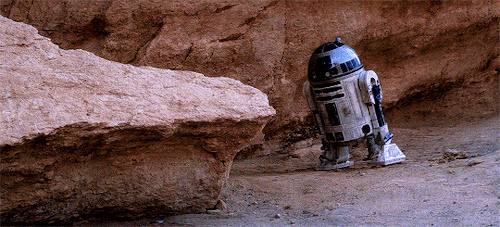
P.S. If we see Luke again in Season 3, at least give the role to a live actor. That digital “rejuvenation” made him look wooden. Luke’s best trait, apart from his compassion, always was his smile.
P.P.S. What’s with Boba Fett claiming Jabba’s throne? I thought Jabba had a son. What in the galaxy happened to him?
P.P.P.S. I don’t mind kickass women, but honestly, I’m getting somehow tired of them. What became of the ladies of Star Wars, the diplomats, the good queens, the loving mothers, the accurate librarians, who contribute to the galaxy without killing (or hurting) anyone? I’m feeling kind of underrepresented here...
#the mandalorian#mando#din djarin#grogu#baby yoda#spoilers#luke skywalker#jedi#the Force#greef karga#disney#disney studios#disney lucasfilm#ben solo#rey#kylo ren#sw#star wars#rogue one#solo#read more#darth vader#tros salt#the rise of skywalker#episode IX#star wars sequels#boba fett#the last jedi#ahsoka tano#anakin skywalker
53 notes
·
View notes
Note
📓
Hi Bones! You're getting the Big P4 Angst Idea! And it's going under a cut cause it's kind of A Beast even in summary form. Title in my head is Guilty Until Proven Capable or possibly just The Second Time Around. Fair warning, this is gonna get a little rambly.
So this one's a Persona 4 fic inspired by the handful of NG+ fics I've read that play with new game plus as a time loop for the protagonists because that's already a juicy concept. Specifically, it takes place at the beginning of the second time through events after getting the bad ending on December 3rd, Do Not Pass Go, Do Not Collect $200, Bad Ending. Narukami wakes up in the Velvet Room the day before he's supposed to leave town and is basically told "you done fucked up, we're gonna give you another shot, but be careful what you try and change." Naturally, after the losses that happened and the evil fog deep unease lingering over town over the three months between making That Choice and leaving town, he jumps right at the chance to fix things. Wakes up on the train going into Inaba and starts the whole cycle over fresh. Things go as expected for most of the first couple of days.
And of course, as is the nature of time travel as a narrative device, the rules and limitations don't get Really Explained until he fucks something up and tries to change too much. Specifically, he tries to prevent Saki Konishi's death.
Specifically, he succeeds in preventing Saki Konishi's death.
And spends the day riding that high until the next morning where he meets up with her again, feels incredibly vindicated that he's already doing better when the bond starts forming and that means she's safe, and... hold up... Magus Arcana? That sounds an awful lot like Magician. And Yosuke's missing from school. Another body's been found. And he knows what's coming at the school assembly, knows what's about to be announced, and somehow seeing it coming makes it so much worse when the principal announces that Yosuke Hanamura has been found murdered. The only thing worse than your best friend being murdered is feeling responsible for it. Even worse than that is not even being able to mourn him properly because at this point you've technically only known him for 3 days.
The second time around, it's Saki Konishi at his side going in to investigate the second victim's death. The second time around, it's not the liquor store in a distorted version of the shopping district but the break room of a dilapidated Junes where Yosuke's last thoughts about the town he hates and the girl who almost makes it worth staying there hang in the stale air and summon the worst parts of the person at Yu's side. The second time around, it's a lot harder to forgive those darkest parts when her shadow talks about how glad she is that he's finally out of her hair and how she only wanted to avenge his death to assuage her guilt at feeling that way.
Harder, but not impossible. She awakens to her persona, Ayame, and again, things proceed mostly as normal.
Next trip to the Velvet Room, the rules get explained: the true victims will always die even if it's not the same ones every time, but not every death that occurred last time was that of a true victim; be careful changing too much from last time lest the team go in just as blind as the first time and twice as out of their depth; face the journey with eyes open not just to what happened as he remembers but as they unfold again, without grief clouding his purpose and they'll find their way to the truth. Easier said than done with one new death on his hands and Nanako's death looming in the future.
Some of the Social Links get shaken up, with Yosuke's father as the new Hanged Man arcana (helping him work through his grief at the loss of his son as he swings wildly between throwing himself blindly into his work, acting as a surrogate helicopter parent to Teddie, and second-guessing everything he's done since his son's death; is he giving his wife space to grieve by taking up the extra work at Junes or is he just hiding from her and his own pain? Is he helping Ted out of the goodness of his own heart because this weird kid needs someone to look after him and it's the right thing to do or is he trying to replace the son he's quickly realizing he didn't know anything about and was probably driving away with the constant moving? Heavy questions to drop on a 16 y/o part timer.) and Naoki replacing Yumi/Ayane as the Sun arcana (medical club rather than drama or band, partly because Naoki cornered him into joining so he could keep an eye on him and get a feel for Narukami's intentions with his sister, and partly because Yu is fascinated by how different the guy is when not numbed by a massive burden of grief he won't let himself process.) And of course letting Saki out of the fridge to be the Magus arcana, as kind and angry and complicated and flawed as the rest of the team, and just as good a friend to him as Yosuke was. With bonus opportunity to relay what Yosuke wanted to tell her about being special if they had both had the chance to live, her rank 10 leads to her awakening to the persona Kushinadahime.
And of course, this wouldn't be complete without addressing the lingering dread of what Yu is certain Nanako's fate is gonna be. Initially he debates keeping an arm's length between them or being The Best Big Bro On The Planet for her and settles on the latter because of course. Throws himself into it when he's not working on the balancing act between essentially metagaming and being complacent in the investigation. As November draws closer and closer, he eventually convinces himself to interfere like he did with Saki in the beginning. Because the most likely person to die in Nanako's place is his uncle and if he knew everything, it's the call Dojima would make. Because he's spent another year of watching his uncle brushing off his daughter and breaking her heart because he can't look her in the eye and deep down, it's hard to feel charitable seeing that and knowing what's going to happen, even knowing why. So he starts working on his argument to convince his parents to adopt Nanako when the time comes.
Through a little extra interference, it's Dojima who gets dragged into the tv alongside Namatame after he fails to kidnap Nanako, although she gets hurt in the struggle to take her and still ends up in the hospital. Rather than Namatame trying to flee after they wreck, it's Adachi who shoves them both in and convinces the team Namatame took Dojima as a hostage. Their shared dungeon is Purgatory rather than Heaven, and Yu's not sure if it's better or worse. Things mostly go as they do in game, although there's also a confrontation with Dojima's shadow before the big fight. It's rough, but they bring everyone home.
Of course, they get the choice right the second time around with Namatame, and when Nanako recovers from the fog everyone's relieved as hell, especially Yu. Y'know, until the guilt of "oh god I was willing to sacrifice my uncle and orphan my cousin to try and save her, what the hell is wrong with me?" hits him like a ton or twelve of bricks. Now that Dojima has seen everything in the other world, has seen firsthand that Yu was telling the truth, Yu confesses everything everything, including the fact that he's done this before and the choice he was going to make. It's, naturally, a lot to process.
The confrontation with Adachi is even angrier, in part because he's done more this time around, in part because of Yu's own guilt. But again, things go as they do in-game.
Playing with the idea of either the Orb of Clarity or Myriad Truths at the very end of the true ending giving everyone else the memories made in the previous "playthrough" or just. Letting that be one of those Protag Things They Never Tell The Team, either way it's gonna be bittersweet as hell because I'm a monster.
I have put so much thought into this work that's gonna be too damn big for me to ever finish if I ever tried to do it. But I need it. But that means I have to write it. Naturally, Andi, if you wanna take this into dms and yell at/with me over this idea, then by all means please do. It's a big enough longfic idea that that's probably the only way it's gonna see anything resembling the light of day.
Send me a 📓 (or other book emoji) and I'll talk about a fic idea I daydream about but haven't gotten around to writing!
#answers to questions y'all actually asked#rattled-bones#persona 4#that's one of the fics that I know would collapse under the weight of its own ambition like a souffle made of creative hubris#especially since I'm not on medication#so it lives as a concept in my brain and makes me sad for catharsis sometimes#i love yosuke but unfortunately sometimes (frequently) when I love a character. I kill them off just to see what happens.
7 notes
·
View notes
Text
Tangled Salt Marathon - Queen for a Day Part 2
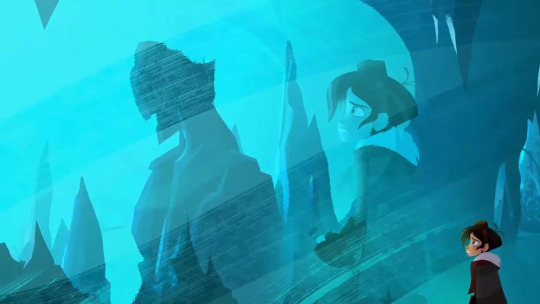
So this is the continuation of my review for Queen for a Day. My personal favorite episode in the series, but it does have some flaws that needs to be pointed out.
You can find the first part here https://rachelbethhines.tumblr.com/post/622226424477171713/tangled-salt-marathon-queen-for-a-day-part-1
Summary: The King and Queen are stranded in the blizzard and Eugene and the Pub Thugs must rescue them. Meanwhile, Varian rushes to ask for Rapunzel's help freeing his dad, but Rapunzel tells him that she can't help him because of the blizzard, leaving Varian feeling betrayed. Rapunzel orders the evacuation of the island, but then remembers about a legend told earlier by Xavier about an underground machine with the power to change the way of the blizzard.
The Show Tells Us Things that Contradict What We’ve Already Seen

No they didn’t.
If it was up to Frederic you’d all be jailed, hanged, or banished. Don’t try to pretend now that the King is somehow better than any other leader when it’s his crack down on crime is what causes 75% of the conflict in the first season.
Rapunzel gave you a second chance. She’s the one to thank. And she only did that because she befriended you, not because she thought the system unjust.
Look at All This Time Spent On This Very Important Note, No Way the Writers Would Dumb Enough Not Follow Up On This Finely Crafted Set Up.
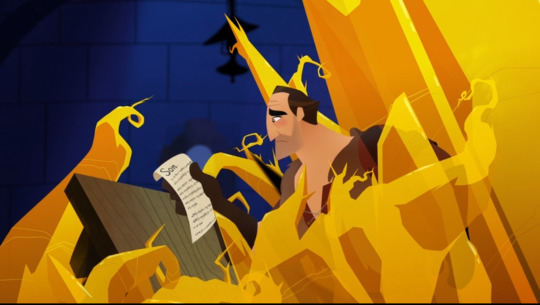

Why is Season Three So Bad!!!!?????
Evacuation is a Dumb Plan to Begin With
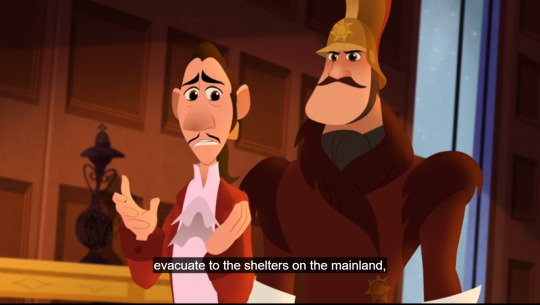
So throughout the episode Rapunzel is being pressured into evacuating the populace off the island. With the idea that, as an island, they’d be cut off from food supplies and whatnot.
Which is beyond dumb because they’re currently inside a castle. Castles are built specifically for withstanding sieges. They should have all the supplies and room that they need right there for weeks if not months.
Everyone is acting like risking exposure is somehow a better option then just staying put, inside the comfy palace.
Also keep in mind no one knows that this is a magic storm. They think it’s just a regular blizzard and it’s not even been one day of snow. You’re telling me that King Frederic is such a poor leader that can’t even keep the kingdom stocked for one day?
You know what. I'd believe that. Corona is a shittly runned country that can’t handle emergencies.
Cass Can Clearly See and Hear What’s Going On


The show will later act as if Cass didn’t know the truth about what happened between Raps and Varian, but that’s a load of bull. She clearly sees and hears Varian talking about the rocks and his dad. In short, Cassandra winds up looking like a horrible person because of poorly thought out framing.
Rapunzel Has More Options Here But She Doesn’t Explore Them
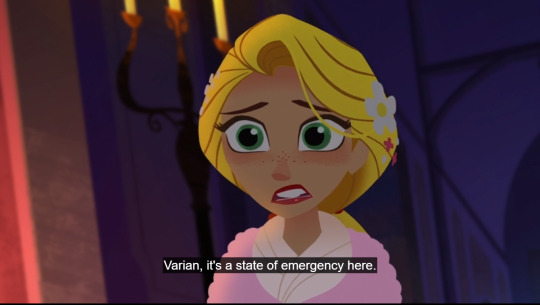
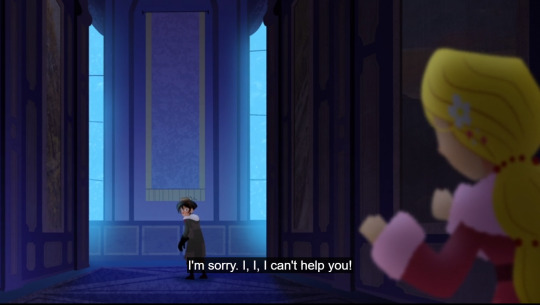
Look Rapunzel being inexperienced and not knowing what to do, leading to her making poor decisions; is a perfectly fine set up for a conflict. And the choices she makes are understandable.
However the show acts like these were the only options available to her; stay and help her people or go with Varian right then, and that’s simply not the case.
Here’s a list of things she actually could have done.
Send someone else with Varian. Cass isn’t doing anything right now. She’s not needed for the evacuation, as evidenced by her going with Raps to the demantius device later (a task that she doesn’t actually help much with) and she already is in on your secret about the rocks and is friends with Varian. Alternatively there are other guards you could have sent with him, but Cass is the best option for the job.
Keep Varian with her until the storm was over with. He could have helped with the demantius device and then you both could have gone to Old Corona afterwards.
Order the evacuation and then actually go with Varian. Once again, Rapunzel isn’t honestly needed for the evacuation, as evidenced by her taking off to find the demantius device later. She also. at the this point, doesn’t know if the demantius device is real nor does she have a plan in place yet to use it. It would have been a worse idea, yes, but it’s still an option that she failed to consider. (Unless they came back to the device after failing to save Quirin, cause it’s fiction and the writers can decide the time frame however they want)
Go check up on Varian after fixing the storm.
None of these options would have saved Quirin, obviously, but any one of them would have given Varian the emotional support that he needed. So while it’s understandable that Rapunzel did what she did, it’s still not excusable.
Therein lies the failure of the show. It tries it damndest to excuse the protagonists at every turn even when they do quite clearly mess up, all while shifting all the blame onto an easy scapegoat. The series then acts like, we the audience, should just blindly accept it’s manipulation as fact.
The Show Implies That the Heroes Just Threw A Child Out Into A Deadly Blizzard
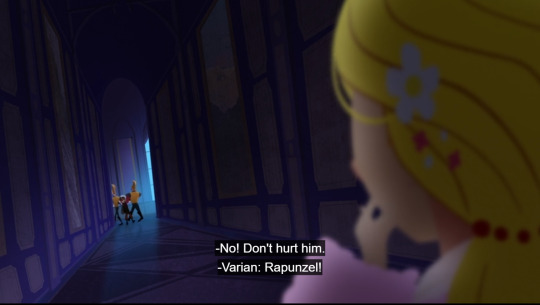
Rapunzel’s ‘orders’ falls on deaf ears and that’s honestly on her. She’s in charge and ergo she needs to keep her guards in line. It’s up to her to give clear and concise orders.
Cause what we see is the garuds dragging away a 14 year old begging for help and next we see him, he’s back out in the snow storm. The snow storm that’s been deemed a national emergency and could potentially kill people stuck out in it.
If the show didn’t intend for us to think that Stan and Pete just chucked the poor kid out the door, than it needed to establish that Varian left of his own accord. But it doesn’t do that. So everyone is Corona just winds up looking like an bunch of asses instead.
Rapunzel Breaking Her Promise isn’t the Point
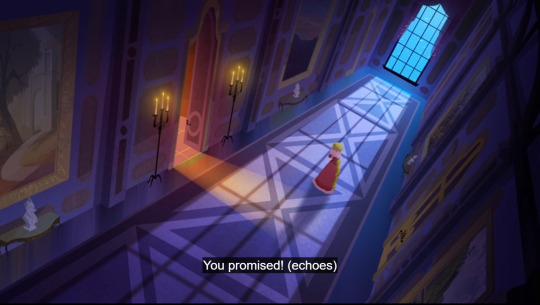
The show gives way too much focus on Rapunzel’s promise. Because not being able to keep a promise is understandable and something that everyone experiences. No, in truth what Rapunzel does here is much worse than that. She fails at her responsibilities as a leader, as an adult, and as a decent human being.
Her promise to Varian doesn’t actually matter. Her friendship with Varian doesn’t actually matter. Her even knowing him doesn’t matter.
Had Varian came to her as a stranger with this same problem and she failed to help him, she’d still be in the wrong. This is a child in need that she ignores. A subject that she is in charge of and responsible for.
Once again, I’m not hating on Rapunzel here. I’m fine, glad even, for the protagonist to make a mistake. But the show fails to even acknowledge that what she did was a mistake to being with; hence the real problem with the character.
Let’s Talk About ‘Daddy’ and How The Creators are Full of It
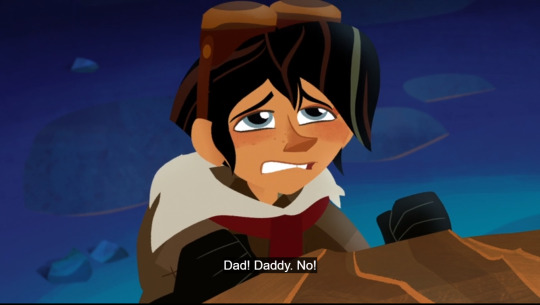
OK so there was some debate about whether or not Varian actually said the word ‘daddy’ in this scene. It was confirmed by one of the creators, Chirs, that yes, Jeremy Jordan (Varian’s VA) ad libbed this line and that the writers decided to keep it.
Which, in of itself, is fine. This scene still hurts like hell and is the most powerfully emotionally hitting scene in the show. It’s awesome.
The problem is the Chris’s reasoning for including the line.
According to the creator, Varian saying the word ‘daddy’ means that’s still immature and not ready yet to know whatever secrets Quirin is keeping from him.
OK first off, calling you father ‘daddy’ does not make you immature. What a stupid thing to say. My siblings and I are all in or 20s, 30s, and 40s, and we still call our father ‘daddy’ as well. (We’re quite spread out in ages)
Secondly, what secrets!? We’re never told what Quirin is hiding from his son. Varian never learns the truth of any earth shattering secret that involves him.
We get lots of behind the scenes hints that the writers prematurely cut Varian out of the plot in later seasons, despite his conflict not being resolved and the fact that he was presented as being integral to main plot.
We’re never given a real reason why Varian’s story so poorly was edited out and any excuses that the series creators, Ben and Chris, have given is nothing but that same BS as this line here and I’m going to call them out on it.
Xavier and Monty Should Have Been Streamlined Into One Character
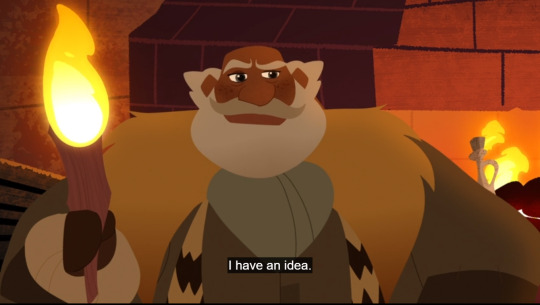
Xavier is given no real introduction and yet he’s suddenly an important part of the main overarching plot. Nor do we ever get any backstory for him or insight into why he does what he does and knows what he knows. He’s just there to give exposition and that’s it.
Meanwhile Monty is given a whole episode worth’s of introduction and insight, but then proceeds to add nothing to the series afterwards.
Just imagine if Monty and Xavier were made into one character. Introduction, insight, plus actual story importance. As an added bonus, it would have forced Raps to deal with someone she doesn’t get along with in order to save the kingdom. Which would counterbalanced the ‘friendship saves the day’ bs of later seasons along with the idea that anyone who doesn’t kiss Rapunzel’s royal arse is a villain.
Once Again, Why Do you Know this Legends and No One Else, Xavier?
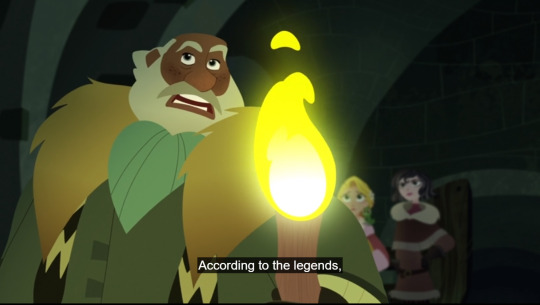
It’s lazy writing. You need to either set these things up beforehand or give reason for them later.
Pascal’s Story Makes Far More Sense After This Scene

The consequence of showing things out of order is that context is lost.
I Love the Reprise but it Gives the Game Away too Early

The writing team can’t decide where they want Varian’s fall into villainy to start and where to have it’s ‘twist’. This is suppose to be foreshadowing, but having it then undermines the ‘surprise betrayal’ in The Alchemist Returns. Not to mention that Varian doesn’t actually do anything truly ‘villainous’ until Secret of the Sundrop anyways.
In short this scene winds up being pointless and the insistence of having a shocking reveal later winds up being redundant. Which in turn then becomes a poor excuse for not featuring a episode dedicated to Varian’s side of the story.
Conclusion
I still love this episode, and I’m saddened that most of the series does not live up to this quality nor its own hype. On its own Queen for a Day is 40 mins of wonderful entertainment. As part of the an on going story it’s a bitter reminder of the disappointment to soon follow.
#varian#rapunzel#tangled#anti-tangled#tangled the series#rapunzel's tangled adventure#tts#rta#queen for a day
137 notes
·
View notes
Note
Who of the DBD original killers do you think would be cool to see in horror movies? What characters do you think have the most potential for a film and what do you think it should/could be like?
Interesting question! Let’s see: Lisa, Sally, Philip, Max, Evan, Herman, Anna, Kenneth, Rin, Frank/Julie/Susie/Joey, Adiris, Danny (kind of), Kazan, Caleb, Talbot, and the Deshayes.
Hmmmm. Danny would work the least well as an original product, because he’s also a Scream expy thing. And then I also don’t think Talbot would work well outside a very DbD like in-universe heavy story, because he just has so much realm context backstory.
Out of the others, they all have potential. Basically none of the sympathetic ones would work as standalone horror characters, because they just didn’t like, /do/ murders before in-realm or live horror lives. The exceptions being Charlotte, Legion, Anna, Max, and Lisa. A lot of the others are definitely interesting enough to be really cool to watch their backstory lives, just, it wouldn’t be traditional horror. Charlotte and Lisa wouldn’t be the antagonists, but they /did/ both live complex horror lives before the realm, and there’s a lot of tragic potential there. Anna, Max, and Legion are all fairly sympathetic killers, but they /did/ live horror experiences before their time in-realm, so they have potential too. Out of them, I think Anna would be the strangest to adapt as traditional horror, since so much of her genre is tragedy and drama, and a narrative from her pov doesn’t play her as living a horror story, while Max and Legion’s do. It /could/ be crazy sad and work though, especially if you say, started the film from the pov of a kid who is kidnapped by her and the family who loses the child, and then only slowly as Anna goes from this horrific thing that kills people and steals children and eats human, to a weird kidnapper mother-wannabe, does she become less a monster and more complex. Maybe then you get flashbacks. It’d be dark, though, because even if you learned her past and understood what she’s been through and why she did what she did, and she and the child form any kind of bond, and she’s temporarily happy with a daughter and full of affection, you know none of her kids ever lived, so it would have to end with the child she’s had a few slow heartwarming moments with falling ill and her working hard to make her better, keep her warm, only to return from a hunt or panicked mission to collect herbs, relieved to have found what she needs, only to find a cold lifeless body waiting. Which she cradles for hours weeping, and then goes to bury finally behind the house, and only then does the audience realize this is one more joining fourteen graves that have come before it. And god, that’s just...so dismal. Chilling.
Uhhh, Max could be really good, but I would be so afraid people would adapt him badly because mentally ill and disabled antagonists in horror like, almost without fail are disgustingly treated. So, this one gives me fear. It could be a really nice character study, slow understanding movie though, where you go from identifying with him and him being the character in a horror situation, to the monster at the end of the film killing anything who comes near him in a frenzied need to be left alone. Also a very tragic and dark film.
The Legion would be a top pick, because it’s less dark and more like, unique? As far as horror goes. You get these kids, kind of a Gingersnaps, The Craft feel horror, with character-driven and a slow build into the actual horror of it all. Things only spiral slowly, and you like and sympathize with at least to some degree the stupid shit teens by the time things fall apart and their is blood on their hands. And there’s just--so much in the air. One murder. Unplanned. Punk troublemakers that just went off the edge into something darker on accident, and never really have time to choose what this means for them as people or if they’ll come back, because they are still in the immediate turmoil of processing that first kill when the Entity grabs them all. Could be really sick. Also there’s so much sweet-tragedy to work with here, I die for it. Ahhh, and baby Jeff Johansen! --Side note: while I think a lot of these would be cool horror films, honestly, I wouldn’t make horror flicks out of any of them. The reason isn’t that they would be bad films, but that I think the ideal way to adapt dbd killers cinematically would be in like, a DbD tie-in miniseries that’s a collection of stories that gives you backstories like archives does, but does it /way/ better. Like how Overwatch does character short films periodically for lore, except longer and probably live action. Or like the Coming To America segments in American Gods before episodes/chapters that introduce characters or backstory. I fkn love that concept in media when it’s done well. I think it would be super sick, and it would be a great way to tie things into dbd while letting different killers have unique flavors and storytelling styles to their shortfilms. (Honestly, DbD as a concept could make for some /fantastic/ tv show material. I’d /love/ to adapt it. And if there /was/ a show, it would be really cool to periodically have episodes that are just character backstories before you go back to the like, over-arching realtime plot).
Uhhhh, Lisa’s would be tragic, and it would /have/ to go full story. Poor kid just living her life, to kidnapped and struggling to survive. Trying to escape. Canibalized and tortured horribly. Eventually dying and vowing revenge. All the way to twisted and abused by the Entity, doing things she never ever would have chosen for herself, for just the...the fucking wholesale tragedy of her. Honestly, if DbD had a show, she’d be a /fantastic/ choice for first or second killer to get a backstory segment or episode, because like, people new to the media would understandably be like ‘yo these monsters are all 100% evil’ but then you get Lisa and you’re like ‘Oh fuck. That was one of the creepiest, and really she’s some poor young woman who needs rescuing as much as the survivors,’ and then there’s just so much left up in the air to question--who else is like her? And who is like Danny, or Freddy? Who is somewhere in between? Great for storytelling.
Uhhh, it’d take a long time to break down how I’d adapt all of these even with me doing shortform like this so I’ll try to be brief. Let me see. Charlotte would be great horror, back to the original question, not my miniseries fantasy, because her whole life is a horror film she’s the victim in, but her situation is complex and fascinating, and she’s a kid, and it’s so tragic, but not in a pointless way. Her life was full of love and pain, but it mattered, to her, to her mom who loved her and died for her, and to the baby brother whose corpse she couldn’t stop cradling and literally carrying not just with but in her. I think you’d have to finish that heartbroken for the girl, and hoping somehow she is able to find healing in whatever time she has left.
Sally and Philip both went through awful stuff, but Philip’s is not really a subject for just a horror film--although his time in Autohaven could be. Sally also had horrific experiences at her job, but again, like Max, less excited about this one because I don’t trust many people to do a good job with an asylum story. If done well, could be really tragic. Watching her fall apart trying to care about the people who just deserve help, and falling apart being abused by the criminals kept right in the next room over. The horrific ‘treatments’, the slow influence of the Entity whispering in her head, her finally fracturing and believing so completely she is saving people by purifying them and setting them free while she smothers a young boy who trusted her to death. Devastating. And Philip’s life overall and his time in autohaven lend themselves very well to horror, and he’d be a magnificent protagonist, I just don’t think if it was mostly the stuff in America, that that’s a full-length movie. Could be a really great like 45 minute short film. God, poor Philip. He deserved /none/ of this. Uhhh, Rin’s is horrific, with her as the victim, but like Philip, there’s not a /ton/ of buildup, so short film, not feature? Also God, poor Rin. She was just a kid. Doing her best. Please, Entity, fucking stop this.
This leaves Evan, Herman, Kenneth, Adiris, Kazan, and Caleb. Out of these, Caleb would make for a really good movie, but I don’t think it would be a horror film? It’d be a drama, or action-adventure. I mean don’t get me wrong--dark drama--his life was fucked--but like, it isn’t very horror-genre. Kenneth would be super gross but he fits classic horror well so if you want a killer clown, let’s goooo, but like? It’d just be two hours of him drugging, torturing and assaulting and then killing kids, teens, young adults, adults, and old people? And like, almost getting caught but not, and then being recruited by the Entity? And there’s just...not a story in there I see very worth telling? So I’d hard pass. Gross.
Uhhhh, Herman is boring if he’s rewrite. Torture bastard but like with mad scientist vibes is more interesting, and I could dig a CIA is evil film. Only, since he canonically kills /everybody/ in the building, you’d either have to retcon, or have a very disappointing film. Because Herman can’t be the pov character if he’s mad scientist Herman--you kinda need to see that from the outside at least as like, a deuteragonist. Not that horror is always disappointing if the cast all dies--sometimes that works--but like. Given the plotline I know Herman’s life takes, I can’t see your protag being slowly mind control tortured and then eventually experimented on and ripped apart until they die Herman’s last day being a very worthwhile storyline. If you retcon the complete losses though, and have maybe a spy who is the pov character, experimented on a lot, tries to escape and is punished, maybe tries to help a friend, tries to kill Herman in retribution for what he does to a colleague, and last day, somehow finds a way to survive whatever is done to them/not end up vegetative for the rest of their life or dead? Maybe puts a plan into action and messes up a machine and gets hit with a much lower than it looks like dosage of electricity and fakes vegetative, and survives, and witnesses the Entity come and take Herman even, and the Entity notices them and is like “Okay...more free food” so you have a last minute terrified beat to shit spy trying to break free of arm restraints and escape the place before the Entity gets them. Maybe rescues someone else too? Then baybeee we got a story with a great antag! Throw in a new protag to spice it up and u got something I’d like to see. If it’s just torture man lover Herman -the mad scientist aspect, I am not super interested but it’s not a /hard/ pass. I keep this pitch, it just becomes a less interesting film.
Adiris baby, I’m so sorry I didn’t do you with the sympathetic killers you know I love you your name was just late in my list because of how I typed it. Uhhh, her life doesn’t lend well to horror, although she’s a fantastic drama or epic. I’d love to see a major focus on her in-relam in a show, but as far as this question goes, I just don’t think that’s her genre.
This leaves Kazan and Evan. Guess I lied before about not going into any detail TuT but I’ll try. Uhhh. Kazan I am just not that interested in the story of? Man goes around killing farmers brutally for no reason. It’s less horror, more historical drama, unless you take the pov of a victim who seeks revenge or something. So, like Herman, he’d need a pov character fix to make it work. But the end result I find much less compelling. I’d probably pass. It’s just not that interesting to me.
Evan. Well, he’d be a good film I think. Classic horror. Rich, privileged, conceited bastard. Even worse father. Dead mom, drama as a young man. Becomes a horrific monster and loves it, cooks workers to death in his foundry furnace for no reason except sadism, lots of kidnapping workers and forcing them into slavery for him and then horrific murder. Kinda a torture-porn leaning here if you’re not careful, but it could be a really solid flick. I don’t think any of his victims survive though, so without a retcon, it’d be a pretty damn dark one. You could have any number of pov characters that just end up burned to death, or beaten to death, or buried alive and suffocated or starved, crushed to death. You could follow Evan and just be overwhelmed with horror and disgust for the person he becomes. But it works better than some of the other dark horror options, so I’d say it has potential. Especially as a lead-in to DbD, because then it works better as a storyline, because it isn’t totally over.
Hope you enjoyed this! Again though, a lot of these could make nice movies, but I think like 45 minute episode TV show for DbD would be ideal, and they’d all make /phenomenal/ backstory short films. Even the ones that really don’t lend to standalone feature.
22 notes
·
View notes
Text
Allison, Leadership, and the Role of a Kind Protagonist
Allison Hargreeves serves as the true protagonist of The Umbrella Academy, and the true leader of the team, and because of the leadership required by the show, these two facts link inextricably. The show, as we know, uses an ensemble cast to tell the story of a family, and I am not trying to take away from the importance of the others because ultimately, her role as protagonist is about her unique journey in the show, not about her importance versus the importance of others. It’s also important to define our terms here. I am going to be talking about Allison as the protagonist, and that means I am going to be talking about Vanya as the antagonist (yay sisters!). These terms do not mean good guy and bad guy. I do not believe Vanya is evil in any way. For my terms, I’m gonna go to The Cambride Introduction to Narrative Second Edition, which says “The Greek word for conflict… is agon and how the agon played out formed the spine of any Greek tragedy… Characters in the narrative were assigned roles in the agon. Thus there was a “protagonist”(hero) and an “antagonist”(the hero’s chief opponent)” (H. Porter Abbot 55). TUA functions as a Greek tragedy. The main characters bring the prophesied bad shit onto themselves in a theater literally named after Icarus. These are my terms: Allison is the protagonist, and Vanya is her chief opponent.
So, Allison. The first time we see Allison, she’s a spectacle. In contrast to Vanya, Luther, and Diego before her, she is well lit, and focus is clearly on her. She is the center of the universe, and she stands alone. Sonically, we hear people calling her name repeatedly as Vanya’s music wanes. The next time we see her, she is being told the news about Reginald. She is the conduit through which we discover what has happened. We see her learning that he died third, but it is the first time we, as audience members, hear it. I’m risking repeating myself, but we hear it with her which centers our discovery around hers. In-universe, the death is made about her. They ask her when she last spoke to Reginald, and what she will wear to the funeral. She remains the center of the universe, and the center of our universe as she is the reason we know what is happening beyond vague sensations. This sequence concludes with Vanya, who was also alone, also had a light on her, being revealed to be unwatched, and in the dark. This lack of attention in a similar situation sets her up in direct opposition to Allison. I only bring this up because the care and focus taken on Vanya in this sequence, and subsequent care and focus given to Vanya, is care and focus that we are also supposed to give to Allison. Vanya is the antagonist, and Allison is her chief opponent.
The next time we see Allison, she’s towering again. She’s backlit with gold light as it streams through her hair, mimicking a halo. She’s descending a staircase to come and meet Vanya at her level. She hugs Vanya, which we see Vanya does not expect. As we’ve been following Vanya (a sympathetic antagonist) thus far, we see Allison’s kindness as good, and correct, and she affirms it as an active choice when Diego comes in and says, very bluntly, that Vanya is not welcome in his eyes. This moment serves as the first hint that Allison is not just the protagonist, but also the best leader in the group. She opposes Diego’s callousness to his face and she is correct. Allison reaffirms to Vanya that she knows she is making the correct choice in welcoming Vanya with literal open arms. “Forget about him,” she says, “I’m glad you’re here.” When Vanya doubts herself, and says she thinks she should leave, Allison makes a direct decision and gives a direct order. She is positioning herself, from the first episode, as a leader who makes concrete decisions, acts on them with conviction, and steps in with said conviction when those around her lack direction or assurance.
This is long already, and I am three scenes into episode one. Whoops. Some rapid fire seems in order. When she talks with Luther about her daughter, she asserts that she will not use her powers to benefit herself anymore because it has negative consequences. She makes a choice, and she sticks to it almost completely throughout the season (and when she fails to stick to it, it serves as a reminder of her flaws as the protagonist of a Greek tragedy). She is the one who draws the link between Klaus not being sober and him not being able to use his powers, showing that she has an awareness of her team as people and an understanding of how they work as heroes. She continues her dedication to Vanya when Vanya leaves without saying goodbye to any of them, while the others fail to care implicitly or explicitly.
Just for flavor, I’m making this a standalone: If everyone had listened to Allison (including Allison), the world would not have ended.
In episode two,Allison affirms that she does not know what to do with herself, and that she has things to do before she reaches her end-goal of being with Claire again. She acknowledges a void in herself that, I would argue, is and should be filled with leadership. This is reflected in her desire to see Claire again, and her having to take steps to get there. Ultimately, it is a complicated desire. She wants it for herself, and she wants it for Claire, and neither of these things are bad. It’s not bad to want things. However, her dedication to doing it right shows a dedication to seeing a plan through, and to being a good person even when it is not personally advantageous, that the leadership in TUA demands. However, she fucks up sometimes. Her fuck ups are disastrous, and they all directly impact Vanya, our antagonist. Allison’s first fuck up comes in this episode. She says “unkind” things to Vanya that, because of her position as morally correct in other instances, lead Vanya to be more open to Leonard than is advisable, and close her off from Allison. This brings me back to my thinking about Greek Tragedy. Allison tells Vanya that her self isolation is her fault, and this leads directly into Vanya meeting with and being open to Leonard when she otherwise wouldn’t be. As the protagonist of a Greek Tragedy, Allison is responsible in part for her own demise from episode two, and this can only be the case because usually Allison is right about things, and the decisions she makes are good decisions. Allison’s time in episode two concludes with her discovering further conspiracy about their Father’s death. Pogo chooses her specifically for this task, for seeing the video tape that suggests that Grace killed Reginald, which puts her directly at the center of the conspiracy. In addition, she was about to leave, and because of this anchor, she no longer feels she can. She, as the protagonist, is trapped by the story. This centralizes crucial plot discoveries on her for a second time in two episodes.
Episode three, for Allison, opens with her making a concrete decision that overrules Luther, the ostensible leader. In reference to the video tape, Luther says “play it again” and Allison replies “We’ve watched it over and over, Luther. It’s the same every time.” Luther making a request of her, Allison denying it, and Luther accepting this denial. He goes on immediately to ask her what is goin on, and he seems to genuinely expect an answer. This says to me that he knows she is smart, observant, and capable. He trusts her abilities more than he trusts his own. It’s also worth noting that when Allison says that Grace did not kill Reginald on purpose, she is completely correct. While interrogating Grace, Allison prioritizes Grace’s emotional state and personal hardships over logistical questions about time and space. This echoes largely throughout her approach to problem solving and leadership in the entire show. While others focus on where, and when, Allison focuses on why. In this moment, Luther’s questions about where and when fail completely, while Allison’s give them explicit proof that something is wrong with Grace in some way or another. This confirms from the start of the third episode that she is, usually, correct in her approach. In her subsequent conversation with Luther about Grace and murder, Allison attempts to understand Grace’s state of being, and refuses Luther’s proposed idea that she does not have one. This plays partially into her projecting her motherly feelings onto Grace, but I think it’s important to note that she’s completely correct. When Allison sides with emotions and emotional intelligence over logic, she is consistently correct.
Allison, as a leader, is capable of bad choices. We go from seeing a good choice (not killing Grace) to her explaining a bad choice she made in the past (rumoring Claire). However, she displays emotional understanding (“I know that’s what three-year olds are supposed to do”), and understanding that it was a choice she made with consequences. She takes responsibility, and is willing to do the emotional work to fix it. The end of this conversation reveals something sort of paradoxical about Allison. When Luther says “some things just take time,” Allison replies “yeah, and some things just stay broken.” To me, this line is fascinating. It feels out of line with all of the work that she is doing, and continues to do throughout the show. I don’t think it’s wrong, though. I don’t think it’s out of character or inconsistent. I think it’s further proof that she is both a good leader, and a protagonist. Allison has the emotional intelligence to understand that things will not always go the way she wants them to, and to work towards being better anyway. She knows that she will fail sometimes, and she does not let this knowledge crush her because she still has work to do. In a way, this feels pretty tragic to me. She suggests that she doubts she will ever be able to see her daughter again, but she is still willing to give up her powers and put in grueling emotional work for something that is one giant question mark in her head. This suggests to me that she thinks the work is worth something even without the result. That being good, now, is just as important as things ending well. This is reflected in her consistent tries with and deliberate prioritization of Vanya throughout the series. As far as Allison knows, being kind to Vanya will not save the world, but Allison wants to be kind to Vanya anyway. She wants to be kind even if the world is ending because, regardless of how broken things may stay, being good now is important to her. On a meta level, we know she is right. If everyone in the series acted like Allison, the world would not have ended.
Allison seeks Vanya out for a family meeting, seemingly without the permission of the others, and pulls her away from Leonard on purpose. She makes the decision to prioritize the family meeting over Leonard, and although she frames it as a request, it is clear in narrative that it is the correct decision (and she is happy to speak for the entire family about it). She apologizes to Vanya for what she said in episode two, and she takes full accountability for the decisions she made. She also, crucially, meets the consequence of that decision for the first time, and she hates him. Vanya calls back to exactly what Allison said, making it clear that Leonard is a Greek Tragedy consequence of Allison’s actions. However, She uses direct language, makes it clear that Vanya was not at fault, and cops to a weakness in her ability to be a good sister, with an invitation for Vanya to communicate better what she needs from Allison.
In the fight at the house with Hazel and Cha Cha, Allison disobeys a direct order from Luther (“You wanna rumor this psycho”) and, instead, gives Diego a knife and an order to “get her.” She holds her own without powers, and she is seen as just as necessary because her command decisions and good eye are crucial to their survival. Without being willing to use her powers, Allison needs a new role on the team, and she falls naturally into leading it when given the opportunity. After the fight is over, she checks in on Vanya, and (imo correctly) expresses to her that she is not equipped for the danger they face. However, she fucks up for a second time, and sends her into the arms of Greek Tragedy, when she listens to Diego’s shitty order to let Vanya go. If Allison had trusted in her own leadership, and followed her principle of doing the right thing now instead of later, the world would not have ended.
In the fourth episode, Allison begins by understanding that Hazel and Cha were looking for Five, that Grace’s death is hard on Diego, and that Luther needs help. She makes the appeal to Luther, the leader, to engage emotionally with the world instead of logically. His refusal is, for our purposes, sort of inconsequential. Had she recognized herself as the leader, and he recognized her as the leader, the conversation would’ve gone differently, but what matters to me, now is that she had the right instinct, and she tried to follow it. Her arc is leadership, not her current moment.
In Vanya’s apartment with Leonard, Allison shows herself to be a formidable opponent, and her presence there to begin with shows advance directive to make decisions, apologize, and be good. She goes, immediately, into Hero Mode when she sees the door open, and crucially, she does not let up. She does not trust Leonard after he tells his lie about having to go to the bathroom. She challenges his authority on her relationship with her sister. She takes away his next direct connection with Vanya, and she makes him leave. She does all of this on the fly, on instinct, because she is a good leader and she understands Leonard’s role in the story.
The next time we see Allison, she is reading a magazine with an interview from (that dirtbag, scumsack, bastard) Patrick about how her old life does not need her. This upsets her, and she endures it anyway as a consequence of her actions. This speaks to a great deal of her fellow Greek Tragedy protagonists. Oedipus accepts his blindness, and his banishment, as a natural result of his actions. She continues to accept consequences regularly, apologizing and working to be better where she can.
She tells Vanya that Leonard is bad news, after telling her that Mom is dead. These both feel like leadership to me. Complicated conversations about emotional reveals are hard, and they fall to those who can easily endure them. She feels for Vanya’s attachment to Leonard, she engages emotionally with Vanya’s connection to Leonard and the underlying feelings, but she refuses to let up on the idea that Leonard is bad. She refuses to give in, not even when it becomes clear that Leonard was there to drop off flowers. She is confirmed as correct because we see Leonard pouring Vanya’s pills down the sink. This mirrors her discovery of Reginald’s death and (alleged) murder.
For the fifth episode, I think it’s important to talk about Allison’s fatal flaw. It ties in closely with her strengths, but sets itself apart in the way that it repeatedly, from here on out, pushes Vanya further into being an antagonist: Allison will do what she thinks is good, and she will do it unrelentingly. In this episode, instead of engaging with Vanya emotionally about Leonard while still keeping an eye on him, she searches him in the library, breaks into his house, and makes it clear to Vanya that she does not trust her judgement. We know, as the audience, that Vanya’s judgement should not be trusted, but we also can see, directly, that Allison’s approach is pushing Vanya away, not pulling her closer. Vanya bringing up Allison’s daughter ties Allison’s former mistakes, and former punishment, to her current mistakes and punishment. This feels, to me, significant in a Greek Tragedy way. Her former fatal flaw, using the easy way every time, feels opposite to her current one. She went from one extreme to another, and they both get her further away from her goals. In this case, I wanted to emphasize this, because I’ve been singing her praise a lot (how could I NOT), and I want to make it clear that I don’t think protagonist means flawless. She is still a complex character in a piece of media that is not over yet and so she still has things to figure out to be the best leader she can be. Episode five is the episode where she shows this most harshly, I believe, until her flaws come for her neck.
In The Day that Wasn’t it is Allison’s decision to not save the world that leaves Luther shocked, because he expects her to do her best to be good. However, good in this case, feels to her like it should be loving her daughter. I find this hard to argue with. She takes the time, though, to be good to Luther, to comfort him. If this day had been left to its own devices, the world would not have ended. This is the weakest paragraph and I know that. I considered deleting it.
In The Day that Was, Allison wants to go seek out Vanya, apologize to her, and talk her through why she wasn’t invited. She was the one to say it was a family matter in both episodes (obviously), further driving Vanya to feel isolated, othered, and angry. She knows this was what set Vanya off, and desires to fix it. She is told not to follow that instinct, and she relents. I’m a broken record at this point, but I believe that if she hadn’t the world would not have ended. She is the one to recognize Harold as Leonard, and to reprioritize Vanya’s safety. In the house, she is the one to discover the anti-shrine in the attic, and understand what it means about Leonard and his motivations. This reminds me of Greek Tragedies as well because, ultimately, Allison is the cause in one way or another of both antagonists’ actions. Leonard and Vanya both resent her and her position in the academy, and she is the only Hargreeves besides Vanya that Leonard ever directly interacts with. They are her chief opponents.
I heard a Rumor, titled after Allison and her second most defining episode, opens with Allison ruminating on past consequences of her actions. It is her voice scoring her bad choice, her narration of a story from their childhood, and her recollection of this moment driving her to do better, now. In essence, she is the only one that matters in this moment. She is alone, and in danger, and seeking out her antagonists, and she is doing it with bravery and determination. The next time we see her, she identifies Vanya’s scarf at a crime scene, and makes the decision to lie to a police officer (something dangerous) to try to get better information in order to protect Vanya better. She does not, at this point, know that Vanya is her antagonist. The lie she tells is smart, and quick, and it works flawlessly up until the point she makes the decision to push further, again for Vanya’s safety. She then succeeds in talking the officer down from anger, but refuses his direct order to stay safe and close. She is in charge of herself.
Allison telling Vanya about Harold, alone and opposed, shows genuine bravery and determination. Her unwillingness, even in the face of Vanya’s powers, to let up on worrying about Vanya’s safety and wellbeing shows a dedication to her position as responsible, and to her dedication to doing good. She feels responsible for this moment.
When Allison tells Vanya that she is the reason Vanya spent her entire life out of the spotlight, Allison takes her position on doing good now to the extreme. She takes responsibility for something she did at four, in hopes that good now means enough, but ready to accept that it might not. The decision to rumor Vanya, I think, comes from the same place that the decision to break into Leonard’s house does. She feels so deeply responsible for the wellbeing of others that she is willing to bend herself to make sure they are well. It is not lost on me that Vanya aims for Allison’s throat, runs away, and then in the next episode refuses to take responsibility for actions that actually are her own. Allison feels responsible for everything, and she takes responsibility for her own brutal assault, because she is a Greek Tragedy and Vanya is an antagonist.“MY FAULT,” Allison writes. Icarus, meet sun.
In the final episode, Allison proves me right, and wrong, in equal measures. She is still a great leader. She suggests the lanes at the bowling alley for an escape. She asks Luther to let her go in alone just to try to connect to Vanya, in the face of powers that potentially robbed her of her last ever opportunity to talk with her daughter. She is the one that makes it to Vanya in a meaningful way, and, as the protagonist of a Greek Tragedy, she is the one that refuses to let Vanya be her antagonist. “SHE’S OUR SISTER,” she wrote. Allison moves the gun to Vanya’s ear, and chooses not to kill her. She chooses this out of her continued, unrelenting dedication to doing good, now. She refuses to see Vanya as the enemy, as someone who needs to be killed, and the show tells us that she is right. Allison’s final facedown with Vanya ends in the decision to save her, and this decision lets all the Hargreeves walk in Allison’s footsteps. They must act with Allison’s kindness, Allison’s emotional intelligence, and Allison’s unyielding dedication to good, now, regardless of later. Allison is the leader, and the protagonist, and she is going to save the world.
#The umbrella academy#Allison Hargreeves#vanya hargreeves#3&7#TUA Meta#luther hargreeves#Umbrella Academy Meta#This is 3.75k words#If you finished this I'm sorry.#ANyway I love Allison
121 notes
·
View notes
Note
Hello there, Chibimyumi. I was wondering that if there were any Black Butler OVAs from seasons 1-2 that you enjoyed. My personal favorite was the Trancy Household OVA as it perfectly shows off the new cast from season 2 better than the first episode. I would've just preferred if season 2 just focused on the original characters and not force the original ones to come back.
Dear Anon,
Hello~! Yes, I actually did enjoy the ‘Hamlet’ OVA from season I and ‘The Making of Kuroshitsuji’ from this season that doesn’t exist ^^
‘That Butler, Performance’
In the second half of the first season Kuroshitsuji just went wacko, and yet it had the gal to take itself so seriously. The Hamlet OVA however, was something of a silver lining in the awful situation that was the first season. Incidentally it’s also the only thing that makes the 4-episode DVD sorta worth the ridiculous price I paid.

The Hamlet OVA stopped attempting to take itself seriously and just had its eyes set on sheer entertainment. Do I think the full potential of the Kuroshitsuji characters/cast was used? No, but at least the OVA didn’t waste it. There was a bit of bitter-irony alongside over-the-topness, but it didn’t try to shove any of it in your face. For once I thought the anime balanced the humour and the edginess of this series well. In short, unlike the rest of the series, the OVA was appropriately self-aware.

Also, Ranmao as seaweed was bliss. More than 10 years have passed, and sometimes when I or my friends eat wakame we still hum “wakame, suki suki♪”.
‘The Making of Kuroshitsuji’
If the second season had existed it would have been GOD AWFUL. The makers knew that the second season was a flop... so OH THEY TRIED TO MILK the OVA potential to get SOME, ANY, DVD sales. There were OVAs for EVERY DVD as opposed to the first season only having the OVA for the last disc.
All OVAs for the second season were (almost) as awful as the season itself, save for ‘The Making of’. The reason this OVA was palatable was for a similar reason as the Hamlet one; it didn’t take itself too seriously and pretend it’s actually good. Some ‘making ofs’ are just always fun, and this premise saved itself from having to write a story that’s actually Kuroshitsuji while the team was woefully incompetent. It’s like these writers only read fan-comments for the first season, decided they knew enough and thought: “we can do a sequel! What could possibly go wrong?”

The ‘making of’ OVA isn’t as well done as it could have been; I would have loved to see how the “cast” actually consisted of actors who would, you know, act? rather than “here, play a supernatural/19th century version of yourself”. I think the ONLY persons in the entire OVA who were actually acting were Alois and Randall. Off-camera they were different people than their roles, and it was cute.
Season II as stand-alone?
Eeehhh.... had the second season focused on Alois and Claude instead, then it’d still have the same chance to either fail miserably or become actually good. If they had been the only protagonists the writers would have to be VERY careful in not making a knock-off version of Sebas and Ciel, while also making sure the audience wouldn’t go: “why is this Black Butler II?” And everyone knows people are fan of the first series mainly because of Sebas and Ciel, so I understand they’d want to capitalise on their popularity.
Albeit begrudgingly, I do have to admit that re-introducing Sebas and Ciel in opposition to the new master-servant-duo was a good choice. But that’s about it. The cause of all failure was that the creators were trying to eat the cake and have it too.
【 Click for a dissection of what this cake is and my angry rant.】
The first episode started trying to fool the audience into thinking that Alois and Claude were the new protagonists. The moment Sebas was reintroduced however, suddenly the nostalgia in old fans would forbid Alois and Claude to ‘replace’ our old duo as protagonists. The old duo couldn’t be the antagonists, and becoming a team was just unlikely. Where would the tension be then? Ciel’s revenge was already ‘solved’, after all. It is not for nothing that Season II tried to desperately rehash the literal same revenge plot.
So, from the moment Sebas appeared the new duo was relegated to side-characters or antagonists. Fine, fine! That’s not the end of the world, but then the creators would need to be competent enough to make sure the fans could genuinely be team Trancy or team Phantomhive, or actually enjoy both. But because Claude was written as the thief who stole Sebastian’s very payment for his work, it made it very hard for anyone to root for Claude’s cause. Sure, then perhaps he could still become a worthy villain to Sebas to, a genuine threat who is not just a demon himself too, but one with demon allies!
But even with four extra demons on his side Claude proved to be hopelessly ineffective in actually becoming a real threat to Sebas (except when PLOT CONVENIENCES happened). And then the series was juggling multiple balls all named ‘main plot’... and dropped all of them.
The following summarises the relations in Season II
Claude x Alois as the protagonists.
Then suddenly insert a Sebas + suitcase → Claude x Alois = antagonists.
Then the focus of the series turned to Sebas & Ciel’s re-revenge. Claude serves Alois, but Alois himself has nothing to do with Ciel, meaning that the two masters have no direct conflict, which meant that Claude & Alois were further relegated as side characters. Ermmm?????
Then Alois became Ciel’s antagonist...because plot. Ô_Ó
But then Claude was not really Sebas’ antagonist anymore... because plot?
And then Claude teams up with Sebas??? Except not really???
AND THEN HANNAH TURNED OUT TO BE THE BIG BAD I think?! But then she was not the big bad...(=o=)
And then at the finale EVERYONE is a loser! ^▽^

Dear Season II, are Alois and Claude THE PROTAGONISTS, ANTAGONISTS, VILLAIN-PROTAGONISTS, or SIDE CHARACTERS!? Choose ONE (or actually develop these characters). Also, are contracts the strongest thing ever for demons or not!? You can’t say it’s both a magical bond with draconian laws and also treat it like a pinky swear between five year olds.
Season II: “NO! I will eat the cake, claim to have baked the cake but not touch the cake, and also have it!”

Related posts:
More angry rants about the anime seasons I and II
My ratings for the Kuroshitsuji animes
Would I support a new faithful adaptation of Kuroshitsuji?
Yana’s opinion on the anime
SebaCiel and the anime’s populism
#kuroshitsuji#Black Butler#anime#Kuroshitsuji anime#black butler anime#season 2#season II#Claude Faustus#Alois Trancy#OVA#Ovas
50 notes
·
View notes
Text
Post-Season One Rewatch Miscellany
Okay I think details are already fading even though I finished in three days, so let’s try to get some thoughts down.
- Vic’s initial coping mechanism is art. After that scares her father, and with her meeting with Manx looming ahead, that’s when she chooses to cope via drinking to forget. Later on, it’s similar; she’s helpless to do anything when she thinks her only way to fight is gone, so she turns to drinking and stops trying to make her family relationships okay. She doesn’t cope well with being helpless, and the drastically worse situation she’s in when Manx becomes aware of her existence pushes her into the things she was trying to avoid. It’s also something she can do with Craig, who she always valued, but earlier thought of as too busy with weed for her. He’s her only real, unconditional support at the time, as she’s become more isolated due to her family crumbling and her boyfriend inadvertently pushing her away.
- On that note; normally I get at least a little unhappy when you have a story in which the main girl doesn’t want someone who’s pining for her and then realizes he’s great, and on my initial watch it did surprise me a little. This time around I still feel a little pang over Drew, mostly over how it foreshadows what she’ll lose later, but I really do like how there’s no judgment in any of it. There’s nothing to say she needed to choose differently at the start, or that she should be judged based on her ability to select a man. She just wanted to be with someone who was there for her at the right time, who she valued, and who wouldn’t abandon her the way everyone else had one way or another. Also, he was a genuinely nice guy who never gave her a hard time over his feelings. I felt for him all right during my first watch, but now I really like him in much the same way as I really like Lou.
- It’s just so awful to watch Vic’s hopes and dreams crumble throughout the season. She tried so hard for everyone that in the end she couldn’t see herself following up on that for her own sake. Of course she didn’t feel like she could go to art school, given the responsibility she felt she had already failed in to protect people, and the baby that was all she had left of her best friend. She didn’t feel like the same person who wanted to go, and she’d feel like the person she was trying to escape becoming—a disappointment to her loved ones (Craig in not saving him), and pregnant before she could find a life of her own. All of that would build up over the years until by next season, unable to find and save kids from Christmasland for years, she feels she’s just as ruined and hopeless as Charlie says she is.
- Relatedly, as on my first watch, I continue to appreciate the irony in how much Charlie ruins and damages what he claims to love and want to protect. He destroyed families and stole children’s futures, and we watch him traumatize Vic long before he decides he’s going to hurt her. We watch him watch her suffering over Maggie and it doesn’t get through to him whatsoever, anymore than Jolene could get through when she actually tried. We watch an episode where Bing, who he hires to hurt people, abducts and sexually assaults her while Charlie discusses her purity with a guy who, even with his own misogyny, seems more clearheaded in his lack of a madonna/whore complex. (Sure, he didn’t ask for that to happen, but that’s the kind of thing he did encourage Bing to do, and he even validates it later. It’s a natural consequence of his words and actions.) Given everything in the season, it looks like Vic would have been well on her way to escaping Haverhill like she wanted, without having ever tasted alcohol or weed first, if not for his effect on her life. It may not be a certainty, and of course none of that made her a bad person like he said, but he did definitely push her in that direction at an important turning point in her life. I haven’t gotten that far into the book, but I keep remembering the line “what Charlie Manx couldn’t do, she did to herself.” (Or something almost exactly that.) This holds true for the show, and it’s also so true of the man himself. We see that with him and Jolene too, with her desperately wanting to believe in him, him being unable to give her a reason to, and the way he doubled down on it by trying to kill her right after. We’ll see more of that in season two. There are immensely sympathetic reasons for him to be messed up and do the wrong thing , just as with Vic,* but we can also see how his opportunities to have the things he wanted become lost, as with her. I love how he and Vic are narrative foils in this story about both how suffering can inform you and limit your choices—taking into account that limits which “only” exist in your head are still very real—and how your choices are your own. It’s very satisfying to me. A good pair of foils is just…neat.
- Speaking of! Vic has so many foils. Her father, her mother, as a parent. Her own son as the victim Charlie does successfully (if temporarily) take away, where he failed with her. Maggie, as the girl who was hunting Charlie before Vic wanted to, and the girl who wants to try for a normal life just when Vic is newly determined and desperate to hunt him with her. Jolene, who got to meet him before he showed himself as who he chose to be and had to do the hunting on her own. Bing, who we meet as someone who shares her desire to escape his current life circumstances. And Millie. The other daddy’s girl. All throughout the season we watch Vic lose faith in her father, and I couldn’t help thinking, when the calls from Christmasland started, of how Millie would go through the same thing next season. They barely interact and they don’t have a relationship, but I am absolutely fascinated by the fact that Millie goes down a similar path, that her own connection to her mother got her calling on Vic for help and gave Vic help in return, and that she must be feeling some things about how her father let her walk into the world alone, but also what she did led to his death. Not wholly unlike how at the same time, Vic is still disillusioned with her own father and watches him be murdered before she can offer him forgiveness or the hope of reconciliation. That is a wonderful mess of feeling and potential narrative fodder.
- When I heard this wasn’t getting renewed, I tried to look on the bright side. At least it wouldn’t get awful, which it still had the potential to do, and it could remain a story I loved. But damn, I rarely vibe with a show the way I do with this one; not even with shows I love do I tend to feel as on the same wavelength as I felt with NOS4A2. So many other things have gotten renewed that are less good, that don’t try to do as much with their characters, or that I just plain don’t care about as much. Whether or not things would’ve gone badly in the end, this show deserved the chance to keep trying. It’s hard to explain, but as a whole it felt unique, unlike much of the television I’ve seen over the years. The show it reminds me the most of is Buffy; mainly in their protagonists, which is the thing I love best about both shows, but also the blend of the personal and the supernatural, the grounding of the supernatural in real life. (After making this observation on my own when watching the first time, I discovered that Vic’s original creator, Joe Hill, said he thought of her as a Buffy in a different time of her life. I love finding connections between my favorite stories, but finding that it was also a connection the writer was making, and the influence is there, was very pleasing.) But it’s very much its own thing. I would’ve loved to see more of it. In the unlikely event that someone has gotten this far and not seen it because it was cancelled, or left it unfinished for the same reason—I’ve seen a couple say that over the last six months or so—I’d encourage you to not let that be a factor! It’s very complete as it is, and rewarding in how it unites characters with themes. I could’ve done with so much more of it.
*I truly appreciate how sympathetic this show is with everyone. Everyone. Every major character is framed as someone to feel empathy for at one point or another, and this is true for most, if not all, of the minor characters too, if I remember this right. We’re asked to carry that empathy when we look at them, when we look at the story as a whole. This show is so stressful and yet so kind, so empathetic. In my opinion, it is so stressful in part because it’s kind and empathetic, because you feel so much for the people who are suffering. I could feel that, and that’s part of my love for it.
#nos4a2#text post#text#I just love it so much#😭#meta#my meta#I guess#this isn’t supposed to be some formal thing. It’s just my personal blog about my feelings and thoughts that you can read because I want to#BTVS#buffy summers#buffy the vampire slayer#buffy#not very present but she does show up and that connection does matter to me#I really hope this shows up well because as if this week I have no laptop and had to post it on my phone
11 notes
·
View notes